
Публикация является частью публикации:
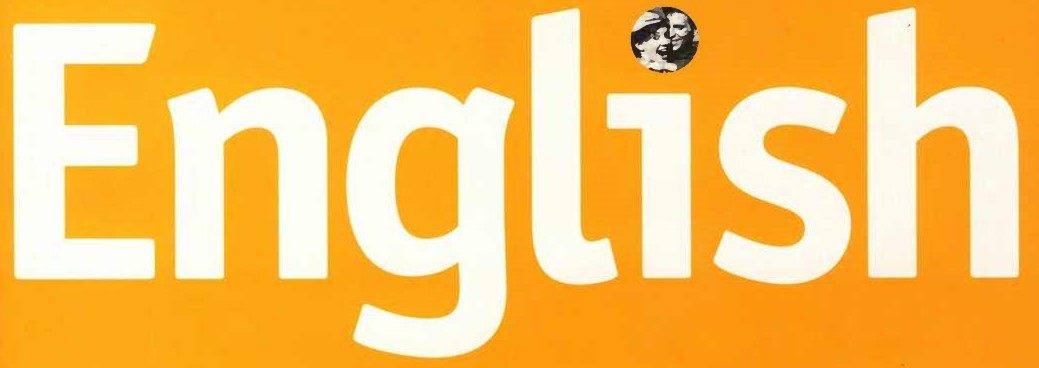 |
 |
|
unit one ... |
|
unit three ... |
saying hello How are you? Would you like ? asking for help grammar
be positive and negative
questions with be vocabulary
jobs numbers (1) countries and nationalities drinks expand your grammar
the with place names expand your vocabulary
containers
a
lot (of) ![]() get to ( arrive at a place) asking the
time likes and dislikes
get to ( arrive at a place) asking the
time likes and dislikes
grammar present simple (l ): positive, negative, and questions wh- questions present simple with he I she vocabulary
noun groups leisure activities telling the time expand your grammar
and, but, because expand your vocabulary
at the sports centre
|
unit five ... |
|
unit seven ... |
What do you have for (breakfast) ? What kind of. ? ordering food asking for more
countable and uncountable
nouns some I any can I can 't + verb (possibility) vocabulary breakfast food adjeaives (2) food expand your grammar
![]() nouns that can be countable and
uncountable expand your vocabulary
nouns that can be countable and
uncountable expand your vocabulary
link words: then/ after that quite and vey What3 he/she like?
![]() When did you last . ?
grammar
When did you last . ?
grammar
past simple: negatives past simple: questions object pronouns vocabulary
life Story appearance character
expand your grammar
possessive pronouns: mine, yours, his, etc.

expand your vocabulary
thing(s)
gtvlng oplmons
Can ...?/Canyou ![]() saying you aren't sure
saying you aren't sure
havegot ( = have) possessive 's this, that, these, those vocabulary technology personal things adjectives (l )
expand your grammar
plural nouns expand your vocabulary
in the office
about an hour a week asking about family
(do something) together
present simple with frequency adverbs possessive adjectives: my, your, etc. vocabulary
daily routines days, months, and seasons time phrases with prepositions families expand your grammar
imperatives expand your vocabulary
weekend routines
both HOW WCS ![]() saying sorry
saying sorry
grammar past simple: was were past simple: regular and irregular verbs vocabulary tourist places past time phrases verb + noun collocation
expand your grammar
before and after expand your vocabulary compound nouns
asking for directions
![]()
how much I many? there is / are vocabulary getting around prepositions Of place come and go; bring and take directions
expand your grammar
infinitives of purpose expand your vocabulary
train travel
|
unit nine ... |
unit eleven ... unit thirteen ... |
normally I (don't) think so Would you prefer ? suggesting and responding
haw to / don 't have to I do I have
to ![]() can
I can •t (permission) vocabulary
can
I can •t (permission) vocabulary
numbers (2) money hotels
expand your grammar short answers expand your vocabulary
hotel rooms
How long does it take? What ore you doing tonight? agreeing and disagreeing Do you ever ? get ( — buy) inviting and responding recommending: should + verb making plans together
![]()
comparative adjectives be going to + verb superlative adjectives might + verb vocabulary vocabulary
shops and products verb * preposition adjectives (3) kinds Of film
expand your grammar too + adjective expand your vocabulary
|
unit ten ... |
|
unit twelve ... |
|
unit fourteen ... |
travel nouns
talking about ages quite/ very well giving opinions offering help grammar
can I
can't (ability) something / anything I nothing, etc ![]() vocabulary
vocabulary
action verbs parts of the body common phrases
expand your grammar somewhere /anywhere/nowhere expand your vocabulary
aches
![]() How about you? phoning a friend
telephone introductions showing you (don't) understand
How about you? phoning a friend
telephone introductions showing you (don't) understand
present
continuous ![]() present simple Vs continuous vocabulary clothes
telephoning
present simple Vs continuous vocabulary clothes
telephoning
expand your grammar
verbs not usually used in the continuous expand your vocabulary
mobile phones
How many times ? have a + adjective + noun
![]()
present perfect (experience) present perfect and past simple vocabulary
opposites feelings fixed phrases
Tick (V) when you've done these sections.
natural English saying hello
How are you? Would you like . . . ? asking for help
grammar be positive and negative a / an questions with be expand your grammar the with place names
vocabulary C] jobs numbers (1) countries and nationalities drinks expand your vocabulary containers
SPAIN
Tomás
how to
Say hello
natural English saying hello
1 Order the words to make sentences.
I B name's/ Tomás / my/ Hi
2 A to/ you / Nice / meet
3 A I'm Hello/ Sandro .
4 B Hello/ Rebecca / my / name's .
5 A meet Ito/ Rebecca / Nice / you .
grammar be positive and negative
2 Are sentences 1 to 8 true or false X?
Tomás is a teacher. ./
Katia is from Barcelona.
2 Katia isn't married. Katia 3 Tomás is from Poland. POLAND 4 Tomás is single.
5 Katia isn't a doctor.
6 Tomás is from Spain.
7 Tomás isn't forty.
8 Katia is thirty.
Make questions from sentences 1 to 8.
Is Tomás a teacher? Yes, he is.
Then answer the questions.
![]()
![]()

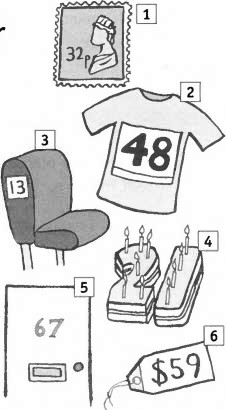 students
students
3 Look at the pictures and complete the
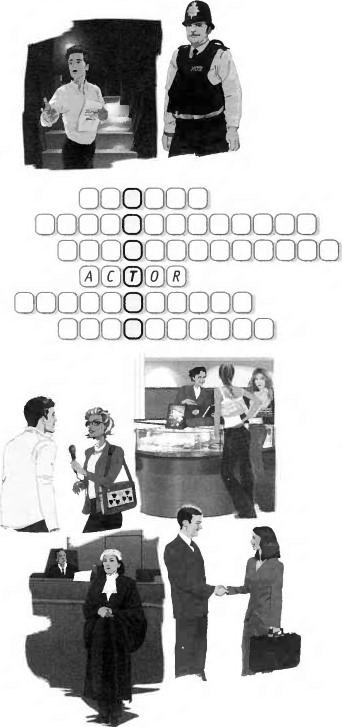 puzzle. Find one
more job. wordbooster
puzzle. Find one
more job. wordbooster
5 Write the numbers for each picture.
I
![]() thirty-two pence
thirty-two pence
![]() 2
3
2
3
![]() 4
4
|
say it! |
|
Say the numbers. |
|
your telephone or mobile phone number your classroom number your house or flat number your age |
![]()
![]()
![]()
![]() 5
dollars
5
dollars
![]() countries and nationalities think
back!
countries and nationalities think
back!
Remember two countries in Asia, Europe, and South America.
6 Complete the sentences. Use nationalities and the correct form of be.
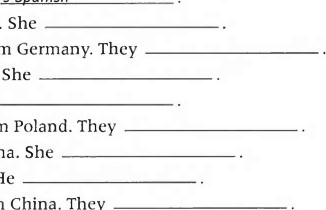 grammar a/ an Juan's
from Spain. He 'S Spanish
grammar a/ an Juan's
from Spain. He 'S Spanish
I Ragini's from Thailand. She
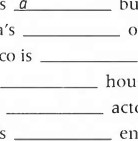 4
Complete the sentences with a Ian.
4
Complete the sentences with a Ian.
2 Heidi and Hans are from Germany. They
![]() Sue's businesswoman. 3
Simone's from France. She
Sue's businesswoman. 3
Simone's from France. She
Lana's office worker. 4 Yuki's from Japan. He
2 Marco is police officer. 5 Ana and Feliks are from Poland. They
3 I'm housewife. 6 Marina's from Argentina. She
4 He's actor. 7 Emiliano's from Italy. He
5 She's engineer. 8 Min and Chao are from China. They
one
your grammar
Use the with names which include:
kingdom islands states republic the Balearic Islands the Dominican Republic the Kingdom of Saudi Arabia
Add the or (—) to the places. Use a dictionary to check new words.
the_ Madeira Islands
United States of America (USA)
2 China
3 Australia
4 United Kingdom (UK)
5 Canary Islands
6 Hungary
7 Brazil
8 Czech Republic
Tick or correct the sentences.
the
Sam is from Balearic Islands.
My Office is In Colombia.
1 Budapest is in the Hungary.
2 Rick is from United States.
3 Helen is a student in Australia.
4 My teacher is from China.
5 London is in United Kingdom.
questioncquestions
English How are you?
7 Complete the dialogue.
|
Paul |
Gemma, |
|
2 Gemma |
thanks. And |
|
4 Paul |
well, |
grammar questions with be
8 Match the questions and answers.
Is he from China?
1 Where is the Eiffel Tower?
2 What's his phone number?
3 Are you in the elementary class?
4 Are they married?
5 How are you?
6 Is she a new student?
7 Who's your teacher?
8 Is he single?
are you?
a Mary. b Fine, thanks. c No, I'm not. d No, they aren't. e 01981 6768 5910. f NO, he's married.
g Yes, he is. h Yes, she is. It's in Paris.
9 Complete the phrases. Use the words in the box.
black orange red diet mineral
|
|
hot |
chocolate juice |
|
2 |
|
cola |
|
3 |
|
water |
|
4 |
|
mne |
|
5 |
|
coffee |
red orange
mineral hot
containers
What is in each container? Tick s/ the boxes.
glass natural English Would you like ?
10 Order the words and complete the dialogues.
A a/ drink/VV0uld/like/y0u ? Would you like a drink? B Yes, please.
A you/ like/ glass/wine IWould/a lof ?
B No, thanks.
2 A like / you / tea / lemon / Would / with ?
B Yes. please.
3 A Would you like a drink?
B diet / Yes/ cola / a / please
4 A like/ hot/ a / Would / chocolate I you ?
B No, thanks.
5 A Would you like a drink ?
B a/ water/ please/ Yes Imineral . say it!
Practise the questions in exercise 10.
Now ask questions. Cover the answers in exercise 9 and use the words in the box. Would you like a hot chocolate?
1 bottle
2 can
3 mug
4 carton
Underline the best word.
Would you like a cup/ carton of coffee?
1 A mug/ glass of red wine, please.
2 Two bottles/ cups of cola.
3 A cup/ carton of orange juice.
4 Would you like a glass/ mug of hot chocolate?
5 Two cans/ cups of diet cola, please.
Would you like ?
one
pronunciation sounds English asking for help abcdefghijklm 12 Write a or b.
a Sorry, Can you repeat that, please? nopqrst1UVxyz b Sorry, can you play that again, please?
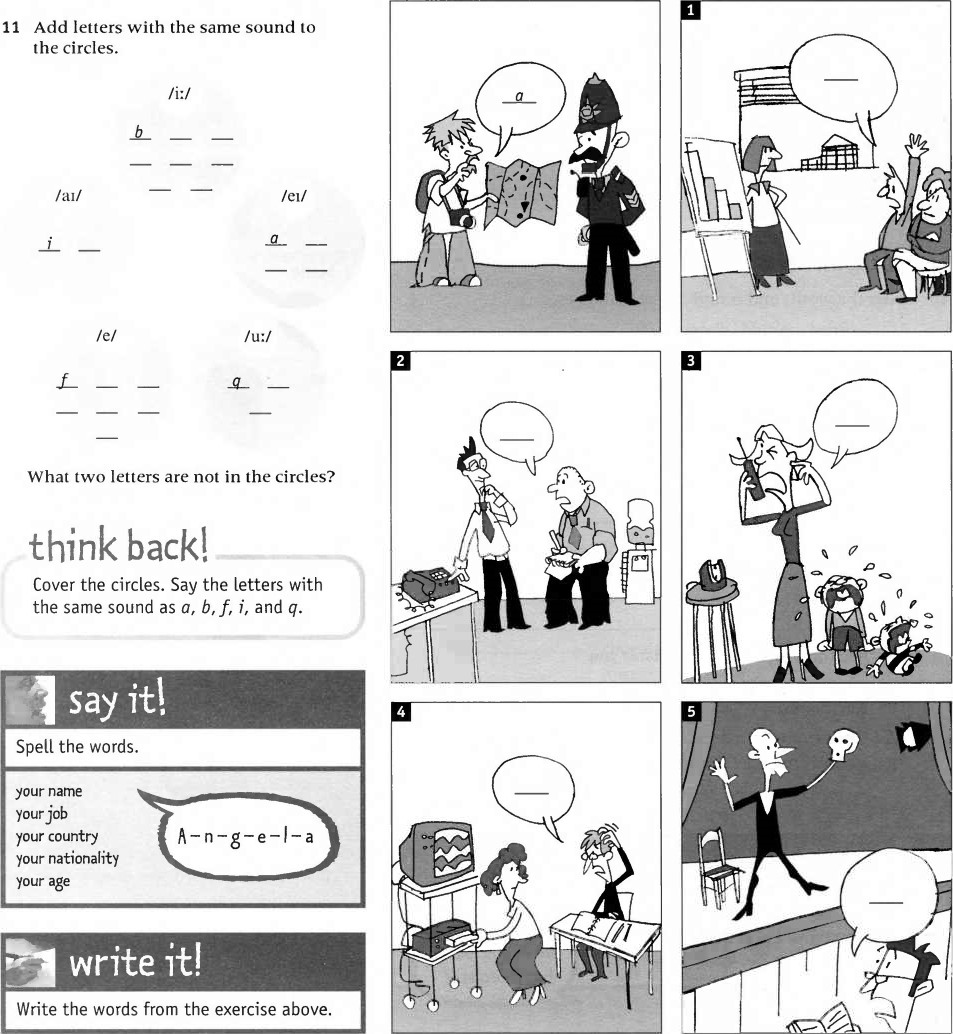
Tick (V) when you've done these
sections. ![]()
natural English have yogglo
thing(s) t one?
C] grvnng opinions
![]()
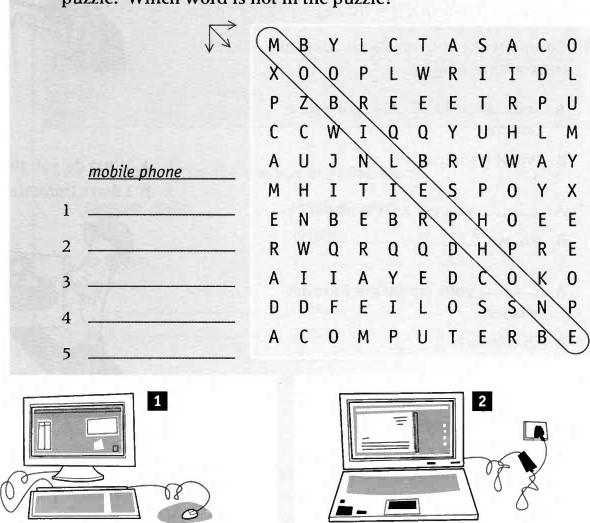 [2
saying you aren't sure
[2
saying you aren't sure ![]() 1
Look at pictures I to 5 and find the words for these things in the puzzle.
Which word is not in the puzzle? grammar
1
Look at pictures I to 5 and find the words for these things in the puzzle.
Which word is not in the puzzle? grammar
 |
|||||
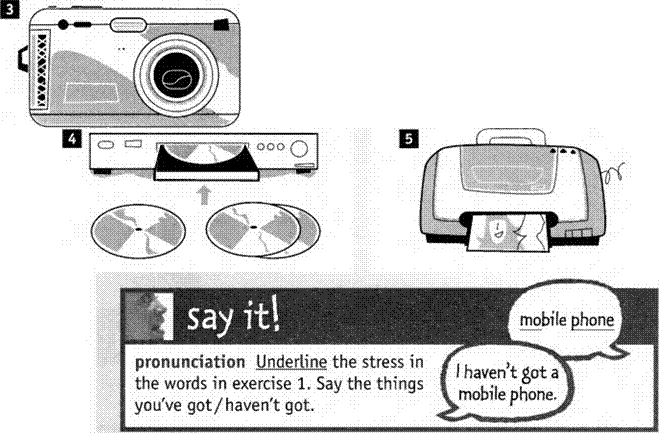 |
|||||
 |
|||||
[2 possessive 's
C] this, that, these, those
C] expand your grammar plural nouns
vocabulary
![]() technology
technology
C] personal things
[2 adjectives (1) ![]() expand your vocabulary in the office
expand your vocabulary in the office
2 Underline the correct word. 4 Complete the conversations. Use the words in the box.
What's laptop?that green thing/ things on your useful laptops CD players expensive necessary mobile phones
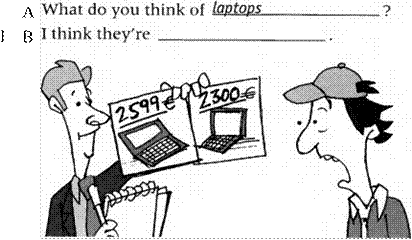
![]() How many thing / things are on your desk?
How many thing / things are on your desk?
2 This blue thing / things is useful.
3 The digital thing / things are fantastic. 4 Does this thing / things take photos?
5 How much are the thing / things over there?
grammar have got (= have)
3 Complete the conversations. Use the correct form Of have.
A Look, Ricardo got a new camera.
B Wow! It's fantastic!
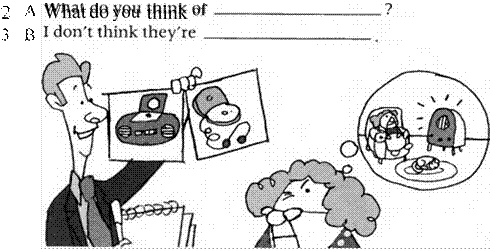
![]()
![]() you
got a DVD player?
you
got a DVD player?
2
B No. we ![]()
![]() your laptop got Internet access?
your laptop got Internet access?
B Of course it
A Where'S your TV?
B We got one.
6

![]() Sandra
got a mobile phone?
Sandra
got a mobile phone?
B Yes, she ![]() 7 . Her number's 04474 8997653.
7 . Her number's 04474 8997653.
8
![]() they got computers in the study
centre?
they got computers in the study
centre?
B I don't think so.
9 ![]() got the new Harry
Potter
got the new Harry
Potter
DVD at home.
B Can I borrow it?
A
 Vicky and Giorgio
Vicky and Giorgio ![]() 10 got a
widescreen TV.
10 got a
widescreen TV.
B What make is it?
two
|
expancJour grammar plural nouns Look at the table.
Cover the table. Write the singular or plural nouns. singular nouns plural nouns
1 computer 2 woman
4people 5 box 6 7 8 nationality Tick or correct the sentences. TheF-aÐ-s in the class are doctors. My students are from Hungary. 1 Javier has got two English dictionarys. 2 The new chairs are blue. 3 How many persons are in your class? 4 Three glass of white wine, please. 5 Guilia and Emilio have got four childrens. 6 The womans at the party are from Brazil. 7 Spain, Hungary, and Greece are European countries. 8 I think the new computeres are great. |
|
Match the pictures with the words. C] bin /bln/ 1desk /desk/
3cupboard /'kAbad/ 4box /bnks/ 5stool /stu:l/ 6photocopier / 'faotaoknpia/ 7noticeboard /'naotlsbo:d/ 8lamp /læmp/ test yourself!
|
 personal things
personal things
5 Look
I p e n c i l
possessive 's
6 Order the words to make sentences.
It/ briefcase / 's/ is Susan .
It is Susan's brie,fcgse,
I Where/ Brigitte
2 is/

5 Maria/ bag/ yellow / is/ new/ 's ![]()
![]()
two
 8
Match the beginnings and endings of the sentences.
8
Match the beginnings and endings of the sentences.
Can you turn off
![]() Can I look at your
Can I look at your
2 Can you help me with
3 Can you open the
4 Can I borrow
5 Can you turn on
a 20p for the coffee machine, please? b door, please? I haven't got a key. C exercise 2, please? It's very difficult.
d the radio, please? It's very noisy. e the light, please? It's dark.
|
|
magazine, please? |
9 |
Underline the Correct word. H = headmaster, A = Amanda, B = Bill H This-is/ That's the staffroom. Bill, Ithis is / that's Amanda. |
the new Spanish teacher.
say it! B Hi Amanda, nice to meet you.
A Hi Bill!
What do you say? H OK, 2this is I that's your desk and 3these I those are your shelves. Use Can I ? / Can you ... ? A Great. 41s that / Is this my computer?
You like Harry Potter. Your Can I H Yes. it is. Er, . 5These are / Those are the book cupboards. friend has got the new DVD. borrow your A Right.
You haven't got a dictionary. DVD, please? H 6This is / That's the coffee machine — the coffee is terrible.
Your partner has. A Oh, I have tea.
It's cold. The fan is on. H Good, good. Oh, 7these / those are your keys.
A Thanks a lot. Er, where's the photocopier?
It's dark. The light is off. 8this is I that's in the school office. H Oh, The English homework exercises are difficult. Your sister speaks English.
10 Match the words with the same word stress. Then match the words with the stress pattern.

 pencila important computer b Japanese
pencila important computer b Japanese
2 magazine C syllable
3 children d hello
4 digitale country
5
Brazil ![]() window
window
[2 get to arrive at a place) asking the time ![]() grammar present simple
grammar present simple
likes and dislikes

![]() 1
Look at the pictures of Todd and Stephy. Complete the texts with grammar a
suitable verb from the box.
1
Look at the pictures of Todd and Stephy. Complete the texts with grammar a
suitable verb from the box.
|
|
present simple (1): positive, negative, and questions |
work |
not work |
go out not go out |
|
|
|
wh- questions |
play (x2) |
take |
live (x2) listen to |
|
|
[2 |
present simple with he/ she expand your grammar and, but, because |
|
Jerzy |
|
|
|
[2 |
vocabulary noun groups leisure activities telling the time expand your vocabulary at the sports centre |
Natalia |
|
Todd |
Polish girl wants friends from all over the world! Hi! I'm 26 and I'm Polish. I in England with my boyfriend, Jerzy. We've got a small flat in a town called Windsor. I'm a lawyer, I in London and in the mornings the train to my office. Jer-zy 3 , he's a student. We 4 a lot; Windsor's got lots of bars and restaurants and there's also a big sports centre where we tennis in the summer. Hope to hear from you. Stephy x |
|
New friends, please! I want to make new friends in different countries. | 6 in Taieri Mouth, a small village in New Zealand. I'm a writer and | 7 my office at home. I'm 34, I'm married to Natalia, and we've got a daughter called Zoe. In my free time | 8 much. I stay in and 9 music |
|||||
or watch TV. On Saturday I 10 football with my friends.
I hope to hear from you soon. write it!
Todd
Write a short paragraph for the website. Include information about your home, your work/ study, and your free time.
about you
|
vocabulary noun groups |
grammar wh- questions |
|
2 Do the puzzle. |
4 Order the words |
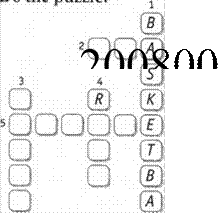

 to
make questions. Then match the questions with responses a to f.
to
make questions. Then match the questions with responses a to f.
your/ name / What/ 's ?
![]() address / What/ your/ 's ?
address / What/ your/ 's ?
2 you/ work/ Where/ do ?
3
teach/ What/ you/
do ? ![]()
4
do/
When/ leave / you/home ? ![]()
5 you I How / get/ work / to/ do ?
![]() 60000000
a French c
124 Elm Street b K-aF.l-M-iust-ene d by car
60000000
a French c
124 Elm Street b K-aF.l-M-iust-ene d by car
|
a game 2 a form of transport 3 a type Of home 4 a thing we eat 5 a place where we work 6
a place where we live natural English a lot (of) . |
natural English get to (= arrive at a place) 5 Look at pictures I to 6 below. Complete the answers. 2
A
How do you get to 3 A How do you get to town? B We take |
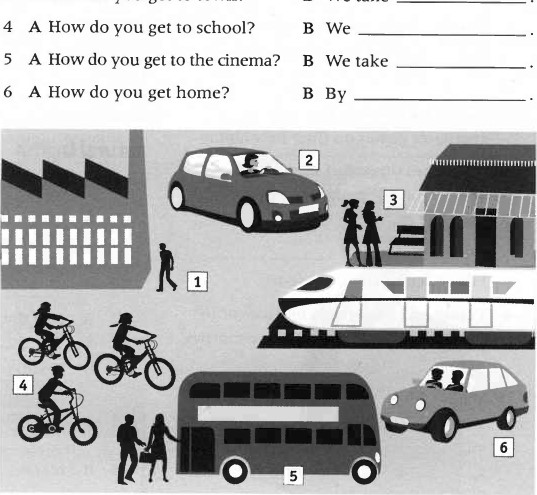 3
put the word in CAPITALS in the correct place.
3
put the word in CAPITALS in the correct place.
ski
Theyka lot. SKI
![]() I drive lot.
I drive lot.
2 They eat a lot Chinese food. OF
3 We Stay at home a. LOT
4 They don't a lot. GO OUT
5 You drink a lot Of. COFFEE
three
 wordbooster
wordbooster
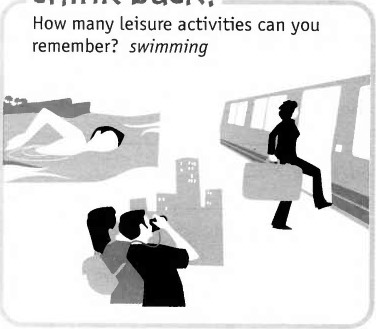 think back!
think back!
How many leisure remember? swimming
6 Order the letters to make a word.
I don't like pools but I quite like
(miimswng) s![]() in the sea.
in the sea.
![]() Henri likes eating but he hates
(kngicoo) c
Henri likes eating but he hates
(kngicoo) c![]()
2 Katrina doesn't like (vnidigr)
d![]() her car in the
town centre.
her car in the
town centre.
3
They
love (linapyg) p ![]() computer games on their new laptop.
computer games on their new laptop.
4
Sally likes
(nppoighs) s ![]() at the new supermarket but her
husband doesn't.
at the new supermarket but her
husband doesn't.
5
I
don't like (kiisgn) s![]()
I think it's a dangerous sport.
6
Penny
and Matt really like (eangirtllv) ![]() to
different countries.
to
different countries.
7
We
love (ndcniga) d![]()
We go to a salsa club on Fridays and Sundays.
8
Do
you like (nighteessig) ![]() when you visit new places?
when you visit new places?
7
 Draw the times on the clocks.
Draw the times on the clocks.
quarter
past twelve ![]() four o'clock
four o'clock
2 ten to six 3 twenty past nine
4
 twenty-five
to eleven
twenty-five
to eleven
5 half past two
6 five to one
7 three fifteen
8 quarter to five
 6
6
test yourself!

Cover the words in exercise 7.
Say the times on the clocks.
natural English asking the time
8 Order the words to make sentences.
|
|
|
quarter/ to / It's/ four . |
2
3
4
5
|
natural English likes and dislikes grammar present simple with he/she 10
drive drink play eat study live we¥-k listen read She works
3 Sheto music. 4 SheEnglish. 5 Shemagazines. 6 Shechocolate. 7 Shewine and beer. 8 Shebasketball. Rowland (R) Anna (A) Klaus (K) 11 Answer the questions about Angela. |
|
swimmlng |
eee |
|
|
|
skiing |
|
eee |
eee |
|
computer games |
|
|
|
|
homework |
eee |
eee |
|
|
learning English |
|
|
eeo |
|
shopping |
|
|
|
|
driving |
|
|
|
I
2
3
9 Look at the table. Complete the sentences using really like, quite like, don 't like, and hate. 4
R I hate shopping and | 1
 5 learning and 1 3
5 learning and 1 3
4
![]() swimming and skiing and I shopping.
but I
swimming and skiing and I shopping.
but I ![]() computer games.
computer games.


Does she study a language? Yes. she does.![]()
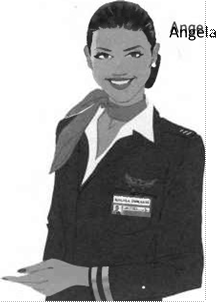
three
|
|
|
Tick (V) when you've done these sections.
natural English about an hour a week ![]() asking about family
asking about family
[2 (do something) together
grammar
![]() present simple with frequency adverbs
present simple with frequency adverbs ![]() possessive adjectives: my, your,
etc.
possessive adjectives: my, your,
etc. ![]() expand your grammar imperatives
expand your grammar imperatives
vocabulary
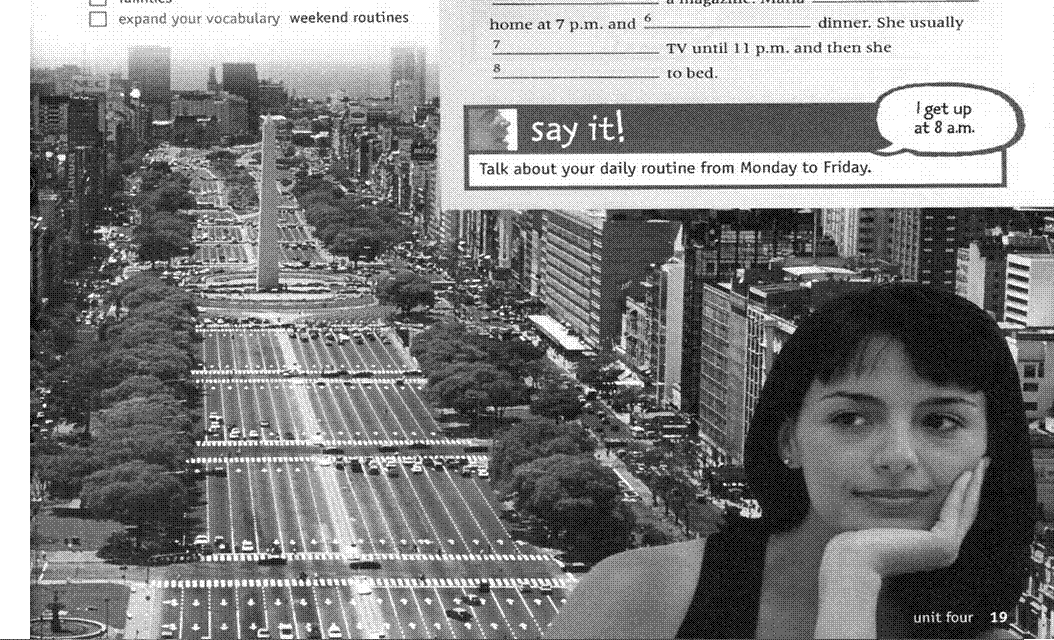
[2
daily routines ![]() days, months, and seasons
days, months, and seasons ![]() time phrases with prepositions
families
time phrases with prepositions
families

1 Complete Maria's daily routine. Use the verbs in the box in the present simple.
watch get (x2) leave have (x2) read go
Maria is 32. She lives in a small flat in the centre of Buenos Aires and works in an office from Monday to Friday. Her days are very busy.
She gets_ue-— at 7.30 a.m. She ![]() home at 8.30 a.m. and 2
home at 8.30 a.m. and 2![]() to work at 9 a.m. At I p.m. Maria
to work at 9 a.m. At I p.m. Maria ![]() lunch
and she
lunch
and she
4 a magazine. Maria 5
|
Use imperatives to give instructions. Look at the examples. Read the text. Write an article. Complete the sentences. Match the pictures to the instructions. Write sentences.
have a bath get-up go to bed make your beds clean the bathroctn take the bus
Çet_ug,_——
. 1
|
2 Write the sentences. Use about.
Christina/ read/ day .
Christina reads about two hours a day,
I George / sleep / night ![]()
2
3
Miguel
/ study English I week ![]()
4 John and Kay I watch TV / night .
5
Javier
/ play computer games/ day ![]()
four
3 Order the words to make sentences.
a read/ usually/ The Times/ I .
|
|
usua(ly read The Times. |
b never
/ I / read / adventure stories ![]()
![]()
c sports
magazines/ sometimes / read Il ![]()
![]()
d love
stories / read/ usually / I ![]()
![]()
e I / on/ often Iread/ bus / the .
![]()
f hardly ever/ buy Il/ books .
![]()
4 Put sentences a to f from exercise 3 into the conversation.
A = journalist B = woman in street
A Excuse me, have you got five minutes to talk about your reading habits? B Yeah, sure.
A First Of all, do you read newspapers?
B Yes,
a ![]()
A And do you read magazines? ![]() at
the weekend.
at
the weekend.
A Where do you like to read?
B Oh, 2 , on my way to work.
A How many books do you buy each month?
B
![]() Oh, 3 ; I usually borrow them from the library.
Oh, 3 ; I usually borrow them from the library.
A What sort Of books do you like?
B well, or books about travel.
A DO you like adventure stories?
![]()
![]() I
don't really like them.
I
don't really like them.
5 Complete the text. Use the words in the box.
months summer March autumn August Seasogs
New Zealand has four segsgns_ They are spring, Summer, and winter. Each season has three
From December to February it's in New Zealand. Autumn starts in 4 and finishes in May. The winter months are June, July, and , and spring is from September to November.
time phrases with prepositions
6 Complete the conversation using on, in, at, or during.
A = Cathy, B = Sue
A
![]() Hi
Sue. I don't usually see you in the library.
Hi
Sue. I don't usually see you in the library.
B Oh, hi Cathy. How are you?
A Fine. Have you got time for a coffee?
B Sorry, I'm busy the moment. I've got a Spanish
2
exam Wednesday.
A
Oh
bad luck! All my exams are July. Well, see you 4![]() the weekend.
the weekend.
B The weekend?
A It's Tom's birthday party Saturday.
B But his birthday's the 30th, that's Thursday.
|
A It Starts B OK. see you there. |
A Yeah, but he gets up early the week for work. B What time does the party start?
![]()
![]() think back!
think back!
How many family words can you remember? father, cousin
7 Read the following sentences and complete Julie's family tree.
Julie's husband is Dave. They've got two children, a girl called Rachel and a boy.
Rachel's got a brother called James.
Harry is Julie's father. He's married to Julie's mother. Anna.
Mike is Harry's brother. He isn't married.
Sylvia is James's aunt. Sylvia isn't married and she hasn't got a boyfriend.
Julie's got two brothers, John and Phil.
John hasn't got any children.
Phil's wife is called Jenny. They've got a baby daughter.
Rosie is James and Rachel's cousin.
8 Look at the family tree below. Match the questions and answers.
Have you got any brothers or sisters,
Rachel? _g_ ![]() Have you got any children, Sylvia?
Have you got any children, Sylvia?
2 Have you got any cousins, Rosie?
3
Have
you got any brothers or sisters, Phil? ![]()
4
Have
you got any nieces Or nephews, Mike? ![]() 5
Have you got any
grandchildren, Harry?
5
Have you got any
grandchildren, Harry? ![]()
a Yes, I've got two. b No, I haven't.
c Yes, I've got three.
d Yes, I've got one brother and two sisters. e Yes, I've got one brother.
|
four |
![]() Yes,
I've got two nephews and two nieces.
Yes,
I've got two nephews and two nieces.
my, your, etc.
9 Complete the text. Use the words in the box.
my (x2) his her (x2) its our (x2) their
Hi, I'm
Krysta and I'm a teacher. I'm from Warsaw and this is the apartment block where
I live with ![]() son, Jerek.
son, Jerek.
![]() apartment's quite small but we like
it. One of the nice things about living here is that we know most of
apartment's quite small but we like
it. One of the nice things about living here is that we know most of ![]() 2
neighbours well. My sister Jolanta has got the apartment next door. She lives
with two cats. Filip and
wife
live at number eight. They've got two children. names are Jakub and Felcia, and Jakub is 6
son's best friend. At number ten there's Kate Smith and husband Simon. They're English
and they've got a little dog. I think
2
neighbours well. My sister Jolanta has got the apartment next door. She lives
with two cats. Filip and
wife
live at number eight. They've got two children. names are Jakub and Felcia, and Jakub is 6
son's best friend. At number ten there's Kate Smith and husband Simon. They're English
and they've got a little dog. I think
8
![]()
write it!
Write about the street or apartment block where you and your neighbours live.
10 Read the texts. Complete the sentences with the Correct names.
Bob Masters I'm Bob. I live with my wife, Sandra. My family is quite big; I've got three children (two boys and a girl) and a granddaughter. I'm 73 and I don't work now but my days are very busy. I go shopping with my wife on Saturdays, and on Sundays
I go to the swimming pool with my daughter.
Jamie Masters I'm Jamie and I'm 33.
I'm married to Patricia and we have a daughter who's three years old. I work in the town library and Patricia teaches English at Kingston School. At the weekend we play tennis and we enjoy going to the cinema. I sometimes go to the pub with my brother,John.
Belinda Masters I'm Belinda. I'm 26.
I'm a teacher at Kingston School.
I'm not married but I've got a boyfriend. His name's Alan. I don't really like sport but I sometimes play golf with my brother, John. On Sundays I usually go swimming with my dad.
![]()
![]() ß-Qþ—
and go shopping together. andplay golf together. andwork together. andplay tennis
together. andgo
swimming together.
ß-Qþ—
and go shopping together. andplay golf together. andwork together. andplay tennis
together. andgo
swimming together.
andgo to the cinema together.
11 Say the words. Add them to the correct group.
|
together |
month |
|
I-huçsday |
thanks |
|
birthday |
|
the |
fifth |
brother |
![]()
|
|
|
||||||||||||
grammar
![]() countable and uncountable nouns some / any
countable and uncountable nouns some / any
C] can/can't + verb (possibility) expand your grammar nouns that can be countable and uncountable
natural English What do you have for ... ?
![]()
![]()
A What do you have for breakfast?
B
I
usually have tea toast.![]() (I / usually I tea / toast.)
(I / usually I tea / toast.) ![]() What
do your children have for breakfast?
What
do your children have for breakfast?
![]() (They I always / cereal.)
(They I always / cereal.) ![]() 2
A What does Luis have for lunch?
2
A What does Luis have for lunch?
![]() (He / often / sandwiches.) 3 A What
do you have for lunch?
(He / often / sandwiches.) 3 A What
do you have for lunch?
![]() (I
I never I lunch.) 4 A What do you have for dinner?
(I
I never I lunch.) 4 A What do you have for dinner?
B ![]() (We / sometimes /
Indian food.) 5
A What does Belinda have for dinner?
(We / sometimes /
Indian food.) 5
A What does Belinda have for dinner?
countable and uncountable nouns
think back!
Remember which nouns are countable (C) and which are uncountable (U). ham (U) cheese apple egg (C) sandwich honey sausage tea
3 Tick a Or b.
a Can I have a sandwich?
b Can I have a piece Of sandwich?
Would you like some coffee? b Would you like an coffee?
There's some water on the table.
b There are some waters on the table.
He eats a apple every day.
b He eats two apples every day.
Can I have a bread and butter?
b Can I have a piece of bread and butter?
![]() I'd like some sausages, please.
I'd like some sausages, please.
b I'd like a piece of sausages, please.
grammar some/ any
4 Correct the sentences. any
Have we got fruit juice?
![]() I'd like any cheese sandwich,
please. 2 Can I have any milk with my cereal?
I'd like any cheese sandwich,
please. 2 Can I have any milk with my cereal?
3
![]() They've
got a apple juice.
They've
got a apple juice.
4 Do you want a bread?
5 Oh no! We haven't got some eggs.
 wordbooster
wordbooster
adjectives (2)
5 Read the text. Underline the adjectives. Then add the adjectives to the table below.
|
cosm•s GREEh DIMER BROOhLVN. NEW YORE. |
|||||||||
|
What do you think of our restaurant? Please comment below. DATE COMMENT NAME |
|||||||||
|
10/12 our -envo•uri+e -por enfiot e icNA4t4ti out. Are Veri ( rtA1ð) we -food. |
|||||||||
|
|
|||||||||
|
|
positive ![]() negative
@
negative
@
|
|
|
test yourself!
Cover the positive adjectives and remember the negative adjectives.
Cover the negative adjectives and remember the positive adjectives.
five
6 Find the words for these things in the puzzle. Write the words.
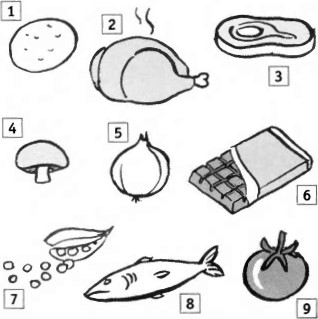
I potato![]() 6
6
![]()
![]() 27
27
38
49
5

|
expan«Jour grammar nouns that can be countable and uncountable Some countable nouns can also be uncountable.
Look at the pictures. Complete the sentences with a, an, or some.
|
![]() N R R o s H v
N R R o s H v ![]() T K c U U U N L R P X
T K c U U U N L R P X ![]()
![]() s
s ![]() A 1 z
A 1 z ![]() A z 1 U natural English What kind
of. . . ?
A z 1 U natural English What kind
of. . . ?
E s ![]() o c o
o c o![]() T E 7
T E 7
![]() the correct answer.
the correct answer.
![]() N
N ![]() Y P N
Y P N ![]() M M
M M ![]() A What kind of wine I ham / soup
have you got? 1 K
A What kind of wine I ham / soup
have you got? 1 K ![]() L B N
L B N ![]() F 1
F 1![]() B Er,... We've got mushroom or chicken today.
B Er,... We've got mushroom or chicken today.
![]()
![]() T o
T o![]() T o E L c M B What Cappucino, kind
of please.fruit juice / coffee / water do you want?
T o E L c M B What Cappucino, kind
of please.fruit juice / coffee / water do you want?
2
![]() A What
kind of jam / fruit I ice-cream have they got? B Chocolate Or vanilla.
A What
kind of jam / fruit I ice-cream have they got? B Chocolate Or vanilla.
3 A What kind Of sandwich I cereal I steak do you want? B Can I have cheese and tomato, please?
4 A What kind Of tea / mineral water / wine do you drink? B We usually drink red.
5 A What kind Of juice / Soup I honey have you got? B We've Only got orange.
 Otder
food
Otder
food
8 Read the text. Complete the sentences. Use can or can't.
eat meat at the restaurant.
have Brazilian food at the Restaurant São Paulo.
get a meal at Il a.m.
3
![]() drink French wine at the restaurant.
drink French wine at the restaurant.
4 listen to music on Tuesdays.
5 smoke in the restaurant. 6 e-mail the restaurant.
7 Youeat in the restaurant on Mondays.
8
You
![]() pay for your meal with a credit
card.
pay for your meal with a credit
card.
d We'll have steak, please.
e Would you like some vegetables 5 or salad with that?
![]() What
would you like to eat? g And would you like anything to drink?
What
would you like to eat? g And would you like anything to drink?
h Good afternoon.
![]() We'll have french fries, please.
We'll have french fries, please.

five
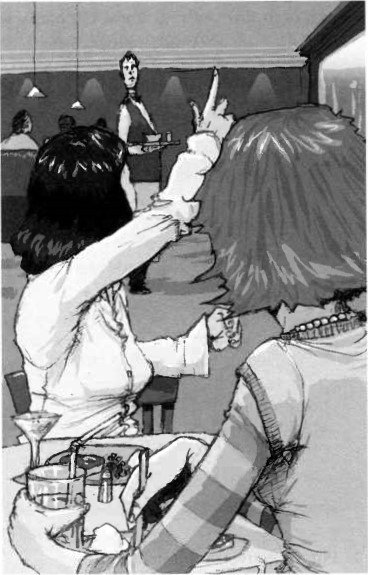
10 Complete the sentences. Use another/
some more.
Can I have another cup Of coffee?
|
food groups Put the words into the correct food group. Use your dictionary to check new words.
Underline the correct word. A Would you like some sweetcorn with your coffee? B No, thanks. I usually drink black coffee. Where's the yoghurt? B in the vegetable/dairy section. 2 A Is there any fruit? B
There are some
grapes/ peppers. 3 A Do you like pork? B No, I don't eat dairy products/ meat. 4 A What kind of vegetables do you want? B Carrots/ turkeys, please. 5 A Do you want some banana/sweetcorn ice-cream? B Yes, please. |
![]()
![]() Can we have french fries? 2
Can I have chicken, please?
Can we have french fries? 2
Can I have chicken, please?
3 Can I have bread roll?
4 Can I have peas?
5 Can we have bottle Of mineral water?
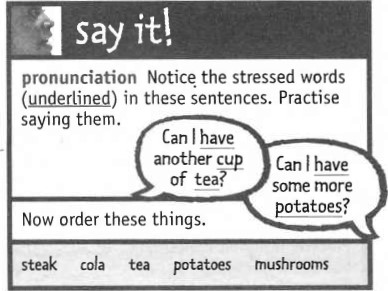
Tick (V) when you've done these sections.
natural English both How was ... ? saying sorry
grammar
past simple: was/ were ![]() past simple: regular and irregular
verbs
past simple: regular and irregular
verbs
C] expand your grammar before and after
vocabulary
![]()
![]() C]
tourist places
C]
tourist places
 a
day out
a
day out
think back!

vocabulary tourist places
1 Order the letters to make words. The words (in brackets) are tourist places.
[2 past time phrases
|
your vocabulary compound nouns Compound nouns are made from two nouns. noun + noun -4 rain + coat— raincoat You write some compound nouns as one word, e.g. raincoat, and some as two words, e.g. tourist office. Match the words to make compound nouns. 1 rainbook 2 backglasses 3
4 guide pack 5 walking coat 6 street f shoes Write the compound nouns for the pictures.
|
![]()
![]()
![]()
![]()
![]() grammar past simple: was/ were
grammar past simple: was/ were
2 Underling the Correct word.
We wasn't / very happy with our bus tour to Windsor yesterday.
![]() The tickets was / were very
expensive.
The tickets was / were very
expensive.
2 We was/ were at the tourist office at 8 a.m. but our bus was lwere late.
3 The bus was / were cold and the seats was / were uncomfortable.
4 The driver wasn't/ weren't very friendly.
5 The tour guide was / were very young and he was / were boring.
6 The museum and the castle was / were closed.
7 The food at the restaurant was /were awful.
8 We was/ were very tired at the end of the day.
3 Read the sentences in exercise 2. Answer the questions below.
Were they happy with their bus tour?
NO. they weren't.![]()
![]() Were the tickets cheap?
Were the tickets cheap?
2 Was their bus late?
3 Was the tour guide interesting?
4 Was the castle closed?
5 Were they tired at the end Of the day?
six
4 Test your general knowledge. Tick (V) the correct answer.
Notre Dame in Paris, and St Paul's in London, are C] a castles.
b cathedrals.
1 The Coliseum and the Vatican are in C] a Rome.
b Venice.
2 China and Thailand are a African countries. b Asian countries.
3 The White House and Camp David are homes ofthe
a US President. b King of Spain.
4 The Nile and the Amazon are a a churches. [2 b rivers.
5 Warsaw and Kraków are cities in a Thrkey.
C) b Poland.
qg 'q' 'et 'el aaMsue
Rewrite the information from the quiz using both.
![]()
2
![]()
4
![]()
5
![]()
 wordbôoster
wordbôoster
5 Order the words to make sentences.
![]() to
/ went / 2003 / They / Miami / in
to
/ went / 2003 / They / Miami / in ![]() They
went to Miami in 2003.
They
went to Miami in 2003. ![]() yesterday / bus/ Our/ was / morning/
late .
yesterday / bus/ Our/ was / morning/
late .
![]()
2 night/ I/ was/ last/ tired .
![]()
3
a
/ museum / days / We / at/ few / ago / were / the ![]()
![]()
4
in
/ 2001 / was / Thailand / in / Roger ![]()
![]()
5
ten
/ my / birthday / was / ago / It/ days ![]()
![]()

6 Complete the sentences with a verb from the box.
do meet go (x2) stay wash play go out clean
Do you want to gQ—— for a walk?
![]() Ricardo hardly ever
Ricardo hardly ever ![]() his
flat.
his
flat.
2 I often my friends for a drink after work.
3 Do you want to to Sam's party on Friday?
4
Selina
often ![]() at home and watches DVDs.
at home and watches DVDs.
5 My mum always with her friends on Friday night.
6
![]() They usually their homework after school.
They usually their homework after school.
7 Do you often cards?
8
David
usually ![]() the car on Sundays.
the car on Sundays.
test yourself!
Cover the answers to exercise 6.
Say the verb + noun collocations, e.g. go —for a walk.
unit
 talk about last weekend
talk about last weekend
|
natural English How was . . . ? |
grammar past simple: regular and irregular verbs |
|
7 Complete the sentences with a suitable |
8 Write the past form of the verbs. |
|
adjective. |
have had— |
|
weekend? |
|
![]()
![]() How was your
How was your
2 and met a really nice girl. 3 decide8 like
It was g . I went to Sam's party buy7 clean
4 meet9
![]() . We went to Paris and we go had a
fantastic time. 5 get up10 stay
. We went to Paris and we go had a
fantastic time. 5 get up10 stay
|
2 It was n _ _. I met some friends for a drink. |
9 |
Complete the conversation. Use the verbs from exercise 8. |
|
3 Abit b _ _ _! I went shopping with |
|
Katie Morning Jan. Sorry I'm late. |
|
my wife. |
|
Jan Hi Katie! How was your weekend? |
|
4 It was |
|
Katie Saturday was a bit boring. John wanted to go shopping |
|
5 Not very i |
|
and we |
|
home and watched TV. |
|
Jan Yeah? Katie We were there for about three hours and he 2 |
![]()
![]()
![]()
![]() one thing, a raincoat. Yesterday, we
one thing, a raincoat. Yesterday, we
![]() 4 the house and then we Johnny Depp film on DVD.
4 the house and then we Johnny Depp film on DVD.
Jan Is it good?
Katie
Yes. ![]() it. DO you want to borrow it?
it. DO you want to borrow it?
Jan Yes, please.
Katie Anyway, how was your weekend?
![]() a lovely weekend. We 8 late and on
Saturday, we 9
a lovely weekend. We 8 late and on
Saturday, we 9![]() to Wicklow for lunch at a new fish restaurant. Yesterday, we 10 Sunita
and Phil for a drink.
to Wicklow for lunch at a new fish restaurant. Yesterday, we 10 Sunita
and Phil for a drink.
Katie Oh, right. Are they well?
Jan Yeah, they're both fine. Do you want a cup Of coffee?

six
|
expancJour grammar before and after
Katie and John went to the clothes shop BEFORE the music shop. Katie and John went to the music shop AFTER the clothes shop.
Choose the correct word.
Jan had a coffee 3 John and Ramsey went for before/ after she got to work. a drink before/ after they played football.
We went for a walk 5 Jane's birthday was before / after dinner. before/ after John's birthday. |
|
|
|
|
You are in the following situations. Say you are sorry and
give a reason. |
|
|
minutes late for your English lesson an hour late for a business meeting 40 minutes late for work minutes late for dinner with your |
friends |
|
|
a watch |
b qermany |
|
coursebook |
a boring |
b doctor |
|
talk /o:/ |
a Brazil |
b sport |
|
church /3:/ |
a market |
b were |
|
shopping [D/ |
a worker |
b got |
|
coffee ID/ |
a Australia |
b student |
10 Complete the sentences.
A I'm Sony, I late.
's fine. Are you okay ? A Yeah, I'm fine, thanks. My train 2 late.
B Don't . We can Start now.
A Tom, Sally! You're here!
B
Hello, Sandra.
I'm 4![]() we're late. We had a problem with the car.
we're late. We had a problem with the car.
A ![]() 5 worry. Come in and have a drink.
5 worry. Come in and have a drink.
11 say words 1-5. Underline the words, a or b, with the same sound.
unit
Tick (V) when you've done these sections.
natural English
C] link words: then/after that quite and very What's he/she like?
![]() When did you last ...?
When did you last ...?
grammar
[2 past simple: negatives past simple: questions ![]() Object pronouns expand your grammar
possessive pronouns: mine, yours, his, etc.
Object pronouns expand your grammar
possessive pronouns: mine, yours, his, etc.
vocabulary [2 life story [2 appearance character
beforehe was famous
![]()
![]()
1 Complete the text with the
verbs in the box.
|
was born |
had |
left |
went |
|
became (x2) |
grew up |
worked |
got married |
Hollywood star Arnold Schwarzenegger lives in California with his wife
and children. His films are popular all over the world. In 2004 Arnie ![]() the Governor Of California.
the Governor Of California.
Arnold
Alois Schwarzenegger ![]() in1947 and
in1947 and
![]() 2
2
in the small village Of Thal, in
Austria. He ![]() school at 18 and he
school at 18 and he ![]() 4 to university in Munich. In Munich, Arnold lived in a small flat and
4 to university in Munich. In Munich, Arnold lived in a small flat and ![]() in a gym.
in a gym.
![]() In 1966, after two years in Munich,
Arnold went to America and
In 1966, after two years in Munich,
Arnold went to America and ![]() 6 an actor. He acted in his first American film Hercules in New York in
1970. Then he went on to star
6 an actor. He acted in his first American film Hercules in New York in
1970. Then he went on to star ![]() in multi-million dollar films such as Total Recall and Terminator. He
met Maria Shriver, the niece Of US President JF Kennedy, at a tennis
tournament. He
in multi-million dollar films such as Total Recall and Terminator. He
met Maria Shriver, the niece Of US President JF Kennedy, at a tennis
tournament. He ![]() 7 to her in 1986 and they
7 to her in 1986 and they ![]() 8 their first child, Katherine, in 1989.
8 their first child, Katherine, in 1989.

|
grammar past simple: negatives |
grammar past simple: questions |
|
|
Antonio Banderas was born in 1960 |
Match the questions and answers about Arnold Schwarzenegger. |
|
|
and grew up in Málaga, a large town in |
When was he born? a Hercules in New York. |
|
|
the south of Spain. He moved to Madrid |
Where did he grow up? b No, he wasn't. |
|
|
in 1981 and joined the National Theatre |
Did he leave school at 18? c He wanted to be a film star. |
|
|
of Spain. After that, he worked as an actor |
Was Arnold |
|
|
in the Spanish film industry. In 1991 |
at university in America? d In a small village in Austria. |
|
|
Antonio moved to America because he wanted to work in Hollywood. He acted |
Why did he go to America? e Yes, he did. |
|
|
in his first American film The Mambo Kinos in 1992. His films include Evita |
What was the name of his first film? f In 1947. |
|
|
with Madonna, The Mask ofZorro, and Spu Kids. In 1996 he got married to |
natural English link words: then/ after that |
|
|
American actress Melanie Griffiths. Write sentences to say how Antonio Banderas's life is different to Arnold Schwarzenegger's. Use the words in brackets. (born/ 1947) |
Are the sentences true or false X? |
|
|
He wasn't born in 1947. |
Arnold and Maria got married, and |
1 learned Spanish and after that, |
|
(grow up / Austria) He didn't grow up in Austria. (go / university) |
then they had a baby. |
learned French. |
|
2 (work/ gym) 3 (go/ America/ 1966) |
|
1 |
|
|
We saw Buckingham Palace, |
Julio bought a house, then he left |
|
|
then we walked to Trafalgar Square. |
university. After that, he worked |
|
(act / first American film/ 1970) |
After that, we went out for lunch. |
in an office. |
![]()
![]() 5 (married/ 1986)
5 (married/ 1986)
|
4 Giorgio left work and then he went for a drink with his friends. After that, he went home. |
5 Ana and Sabrina got up, then they went to school. After that, they had breakfast. |
seven
 wordbooster
wordbooster
5 Describe the people in the picture with Words from the box.
quite short very tall veryshort
![]() short quite tall
short quite tall
![]() I —tat— 2 3
I —tat— 2 3
6 Complete the descriptions.
He's tall and a bit f .
She's got 1m _ -length 2d![]() _
brown hair.
_
brown hair.
He's got 3s_ _ hair, 4ab![]() _
and a 5m
_
and a 5m![]()
He's quite 6t_ , he's got 7b![]() _
hair, and he's very 8 good-I _ _
_
hair, and he's very 8 good-I _ _![]()
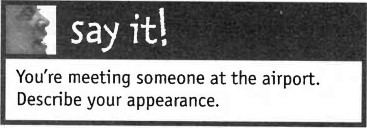
7 Complete the crossword with the opposites of 1 to 6.
1 nice
2 strict
3 interesting
4 hard-working
5 stupid
6 serious
![]()
![]()
![]() 4 5 6
think back!
4 5 6
think back!
Remember two more words to describe appearance and two more words to describe character. good-looking, interesting test yourself!
Cover the puzzle clues. Say the opposites of the words in the puzzle,
e.g. The opposite of horrible is nice.
8 Complete the conversation with me, you, it, him, her, us, and them.
Peter Hey, what's this?
Liza That's my school photo, give it— to me!
natural English When did you last . ?
10 Order the words to make questions.
did/ your/When/see/parents/last/you ?
When did last see your parents?
![]() Peter I can't see in
it.
Peter I can't see in
it. ![]() did / last I french fries I you / eat/ When ?
did / last I french fries I you / eat/ When ?
Liza That's , with the long hair and glasses. Those are
![]()
my friends, Debbie and Barbara. You met 3 at our
|
Peter |
Who's the tall man with the beard? |
|
|
|
Liza |
That's Mr Crawley. I hated |
3 |
did IWhen I last /English lyou / speak ? |
|
|
boring. The blonde woman was our French teacher, Madame |
|
|
|
|
Dupont. saw |
4 |
play / you / did/ last I When / football ? |
|
Peter |
You're all very happy here. |
|
|
|
Liza |
Yeah, the teachers told 7 to smile! |
5 |
travelled I was/ When / time / train / the / |
![]()
![]()
![]()
![]() 2 your / washed / When / you I was /
time / wedding! And that's Stewen, I went out with for a car/ the/ last ? week
when I was 14.
2 your / washed / When / you I was /
time / wedding! And that's Stewen, I went out with for a car/ the/ last ? week
when I was 14.
Peter Well, what do you want to do with the photo? by/ you / last ?
![]() 8
8
9 Underline
A
B
A
B
2 A
B
3 A
B
4 A
B
5 A
B
seven
|
|
|
![]() Tick (V) when you've done these
sections.cot lost!
Tick (V) when you've done these
sections.cot lost!
natural English ![]() asking for directions
asking for directions
![]() grammar how much /
many?
grammar how much /
many?
C] there is / are
[2 expand your grammar infinitives of purpose
vocabulary ![]() getting around
getting around
![]()
[2 prepositions Of place 1 Read
the text. Put the pictures in order. come and go; bring and take øar•
Last Thursday I had an interview in London for a job as a tour directions guide
with a big travel company. I had a problem with my car expand your vocabulary
train travel so I decided to take the train. My map of London was in the car
and I forgot to take it with me. Anyway, 1 got to the station and got on the
right train. When I arrived in London I asked a man for directions.
Unfortunately, he gave me the wrong directions, so I arrived half an hour late
for my interview.
I can't When I left the office I didn't ask for directions to get back to the remember. train station and I forgot the way. It was dark and it was difficult to see the street signs but eventually, 1 arrived at the Station. I got on the 6 0' clock train to Egham and started to read my magazine. The journey to Egham usually takes half an hour so when the train stopped at 6.30, I got off. The train left and that's when I realized I was at the wrong station.
I got home at 10 p.m. that night — oh, and I didn't get the job!
grammar how much/ many ?
our o bulary
1045
0818 0830 0839 0939 1115
0834 0857 0906 10060945 1125
0856 1039 1145
ONE Nil' RTN
15, SEP•ø6 23555 514295268$4
OXFORD •
15.SEP•Ø6
BRIGHTON •
NOT LONDON
0733
2 Read the conversation. Write questions about Nadine's holiday using how much or how many.
Fiona Did you have a good time?
Nadine Oh, it was great. Egypt's really beautiful. Match the words and definitions.
Fiona Where did you go?
[E] This is a person who travels on a train. Nadine Well, we started out in Alexandria and then we stayed in a
1 C] Buy your ticket here. hotel in Cairo for four days. After that, we took a train to
2 This is a ticket from A —s B. Luxor and Aswan. We were on the train for 14 hours and we didn't have any food. 3 Go here to get on your train.
Fiona Was Egypt expensive?
4 C] This is a ticket from A B and then in Cairo
from B —s A. Nadine No, I took $1,000 and I bought quite a lot Of things but I've still got $350.
5 [2 This gives you information about train times. Fiona What did you get?
Nadine They had some fantastic jewellery; I got some beautiful a single d ticket Office rings, three gold bracelets, and some nice earrings. b timetable
c return f platform Fiona so, where's my present?
Nadine Well, I got you this book about the pyramids.
Complete the sentences. Use words a to f. How many places did visit?
Good morning. I'd like a ticket to Dublin, (places / visit) please. I (days / stay / Cairo)
A Sinale or a 2 (hours / be I on train) Which does the Edinburgh 3 (food/ have / on train) train leave from? 4 (money I take)
B Number 4, over there. 5 (jewellery / buy) 3 A All for the 9.15 train to Paris go to platform 2.
Where can I buy a ticket? say it!
B There's a over there. We visited a Tina, what time's the next train to Brighton? Answer the questions for Nadine in the exercise above. few places. B I don't know, I haven't got a Use none, a few, not much, quite a lot, a lot.
eight
|
3 Read the sentences. Write the words for the underlined places (1—9 in the map). The mosque is opposite the bank. |
4 Complete the dialogues with the correct form Of come, go, bring, and take. A I think we're lost.
|
![]() The is between the mosque and the
cinema. B Why didn't you a map? The is at the end of the street.
The is between the mosque and the
cinema. B Why didn't you a map? The is at the end of the street. ![]() A Did you go out last night?
A Did you go out last night?
|
There are three cars in the car_park behind the train station. |
|
B Yes, it was my wife's birthday so I |
|
The restau_ant is next to the bank. |
|
|
|
The cinema is opposite the computer shop. |
2 |
A What did you do yesterday? |
|
Two people are near the statue. |
|
B we |
|
The statue is in front of the hotel. |
|
the morning and the Royal Palace in |
|
A bird is on the school. |
|
the afternoon. |
3
![]() A Do you
often
A Do you
often![]() here?
here?
B Yes, this is my favourite restaurant. The food's wonderful.
4 A Is Tony here?
B No, he![]() to his Spanish class on Mondays.
to his Spanish class on Mondays.
5 A Are these Mr Smith's bags?
B Yes. Can you![]() them up to him? He's in room 203.
them up to him? He's in room 203.
6 A I'm really hungry.
![]() some extra sandwiches today. Would you like one?
some extra sandwiches today. Would you like one?
7
A Did you![]() a guidebook?
a guidebook?
B NO, but we can buy one in that bookshop.
8 A How was your weekend?
B Great. My brother and his children ![]() to visit me.
to visit me.
I bank 6
|
write it! |
|
Write a description of the street where your house, school, or office is. |
|
I live in Rose Street. There's a shop next to my |
![]()
![]() 27
27
38
49 5 test yourself!
Cover the sentences in exercise 3 and describe the map.
 get around a building
get around a building
5 Underline the correct word.
There arg / aren't some coursebooks on the table.
![]() There isn't/ aren't a computer on the desk. 2 Is there a / some map of
the town in the library?
There isn't/ aren't a computer on the desk. 2 Is there a / some map of
the town in the library?
3 There are / aren't some rulers in the classroom.
4 Is there a / any dictionary in the cupboard?
5 There isn't 1' aren't any toilets on the second floor.
6 Complete the sentences.
A Excuse me, wher-e3— the photocopier?
B It's over there.
A Excuse me.
any computers?
B Yes, they're on the second floor.
2 A Excuse me, are the DVDs?
B They're on the first floor, with the videos.
3 A Excuse me. Is there a fax machine?
B No, I'm
4 A Excuse me. Is there a café?
B No but there's a drinks machine on the first floor.
5 A Excuse me. Where are the toilets?
B They're ground floor.
Excuse me, where's the hotocopier?
pronunciation Notice the stressed words (underlined) in this question. Practise saying the questions in exercise 6. Now ask for these things in the library.
videos newspapers CDs
eight
7 Follow the directions from reception. Write what the visitors did at the university, a to f.
![]() d He
sent ane-mail.
d He
sent ane-mail.
|
b She borrowed a book from the library. c We spoke to the Japanese teacher. |
e They had an exam. f He used the toilets. |
Turn left and go along the corridor, then turn right. It's the third door on your left.
![]() Turn right. it's at the end of the corridor.
Turn right. it's at the end of the corridor.
2 Turn left, go along the corridor, then turn right. They're at the end of the corridor, on your left.
3 Turn right, it's the first door on your left.
4 Turn left, it's the room at the end of the corridor.
5 Turn left, go along the corridor, then turn right and go to the end of the corridor. Thrn right again, it's the second door on your right.
Japanese Spanish meeting room toilets department department
English department book cupboard
Reception you
are lecture room
here
coffee
library computer room I exam room
Turn left, go along the corridor, then turn right.
|
Look at the map. Give directions from reception to these places. |
It's the |
|
book cupboard Spanish department stairs coffee room |
lecture room |
|
infinitives of purpose An infinitive is to + a verb e.g. to go, to see, to have. We use infinitives of purpose to show why someone does something. Look at the examples. Layla went to the train station to meet her friend. They went to a restaurant to have lunch. They went to the cinema to see a film.
Match the questions and answers. Why did you go to thea To see where Sallýs train station?new house is. 1
2 Why do you want to goc TO take the train to to the café? London. TO meet some friends. 3 Why did he get a timetable? e To check my spelling. Why did you go to the pub on Friday? To send e-mails to my friends. 5 Why do you want a computer? g To take photos 6 Why did he buy that map? on holiday. h To find out the times 7 Why did you buy a dictionary? Of the buses to Madrid. 8 Why did they buy a digital camera? To buy a sandwich. |
sausages Russia chef fish chips ![]() journalist teacher
journalist teacher
Tick (V) when you've done these sections.
natural English normally
![]() [2 I (don't) think so
[2 I (don't) think so
[2 Would you prefer ?
C] suggesting and responding
![]()
grammar ![]() have to/ don't have to/do I have to
.
have to/ don't have to/do I have to
. ![]()
![]() can /can't (permission)
can /can't (permission)
[2 expand your grammar short answers
vocabulary ![]() numbers (2)
numbers (2) ![]() money
money
![]()
C] hotels ![]() expand your vocabulary hotel rooms
expand your vocabulary hotel rooms
 backpacking
backpacking
grammar have to/ don't have to/ do I have to . . . ?
1
Read about Sunny
Reef Camp Site. Are sentences I to 8 true ![]() or false X ?
or false X ?
You have to make your breakfast. X
![]() You don't have to be 18 years old to
use the bar.
You don't have to be 18 years old to
use the bar.
2 You have to share the kitchen.
3 You have to be quiet after I o'clock at night.
4 You have to clean the shower after you use it.
5 You have to check in before 2 0'clock in the afternoon.
6 You don't have to pay for your car.
7 You have to book online.
8 You don't have to pay when you arrive.
|
short answers Look at the examples. |
|
|
question |
short answer (long answer) |
|
Haye you got a dictionary? |
Yes, I have (got a dictionary). |
|
Did he enjoy his holiday? |
Yes, he did (enjoy his holiday). |
|
Can I pay with my credit card? |
Yes, you
can (pay with your credit card). |
|
Write short answers to the questions.
Does he like swimming? Yes, he 2 Was the bus late? Yes, It 3 Can I borrow this pen? Yes, you 4 Do you live in Madrid? Yes, I 5 Did they play football last week? NO, they 6 Has your father got a car? Yes, he 7 Are they Italian? Yes, they 8 Has she got any money? Yes, she |
|
2
![]()
![]()
![]()
![]()
![]()
![]() Look at
the camp site information
Look at
the camp site information
(on page 44). Answer the questions.
Do I have to check in after 2 p.m.?
I DO I have to pay for my baby?
2 Do I have to bring my own cooking equipment?
3 Do I have to eat in the restaurant?
4 Do I have to book by telephone?
5 DO I have to pay by credit card?
grammar can/can't (permission)
3 Look at the camp site information.
Complete the sentences with can or can't.
You can![]() swim in the mornings.
swim in the mornings.
![]()
![]() You
You ![]() have breakfast in the restaurant.
have breakfast in the restaurant.
2
You ![]() go into the restaurant at 8 p.m.
go into the restaurant at 8 p.m.
|
3 |
You |
|
|
|
camp site. |
natural English normally /'na:mali/ |
|
4 |
You smoke in the shop. |
|
|
5 |
Children |
4 Match the questions and answers. |
in the bar.
![]() a at a camp site test yourself! b
by train
a at a camp site test yourself! b
by train
nine
e thirteen euros forty-five
5 f one euro eighty money
7 Match the beginnings and endings of the sentences. 6 Complete the Taylors' bill using the numbers a to f below.
|
ZEUS FAMILY HOSTEL Dorou Street, Athens
Name..
Number of children...3.... Meals
|
![]()
![]()
![]() The shop sells
The shop sells
![]() Did you buy a
Did you buy a
2 We had to pay a
3 Antonio didn't spend
4 We decided to share the
5 Maria paid for the room
6
![]() How much
did the holiday
How much
did the holiday
7
You usually have
to pay 8 We booked for four nights and ![]()
a 10% service in restaurants.
b with her credit card.
c restaurant bill. so I paid half. d new backpack for your holiday? e much money in Belgium.
![]() saved €100.
saved €100.
h![]() deposit when we booked.
deposit when we booked.
![]() cost?
cost?
 book a room
book a room
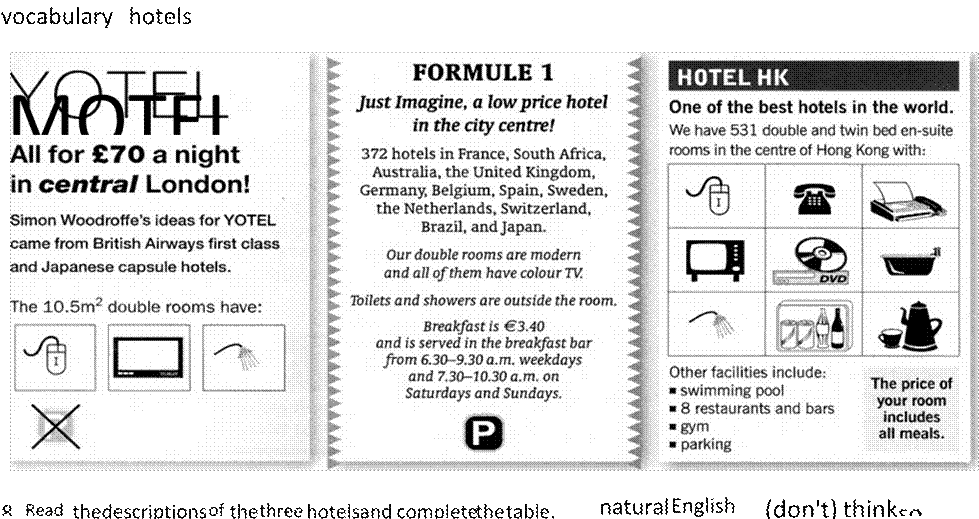
|
Yotel |
Formule 1 |
Hotel HK |
|
double rooms |
|
|
|
1 en-suite rooms |
|
|
|
2 bath |
|
|
|
3 shower |
|
|
|
4 Internet access |
|
|
|
5 parking |
|
|
|
6 swimming pool |
|
|
|
7 gym |
|
|
|
8 restaurant |
|
|
|
9 bar |
|
|
|
10 breakfast included in price |
|
|
![]()
![]()
![]() 9 Order the words to make questions.
9 Order the words to make questions.
en-suite / Has / got / it / rooms ?
A
Has it got
en-suite rooms? ![]() B don't think so.
B don't think so. ![]() got / pool / hotel / Has / a / the ?
got / pool / hotel / Has / a / the ?
B I don't think So.
2 it / a/ restaurant / Has/ got ?
B I don't think so. 3 gym/ there / Is/ a ?
B I don't think so.
4 breakfast / the / included / Is/ price/ in ?
![]()
![]()
![]() B I don't think so.
B I don't think so.
5 Are / any / available / there / rooms ?
B Yes, I think so.
nine
|
Match the words with the pictures. towel /'taoal/ 1 a sheet /Ji:t/ 5 balcony / I bælkani/ 2 blanket /'blænklt/' 6 C] pillow /'prloo," 3 hanger 7 fan /fæn/ 4 C] kettle /'ketl/ 8 Cl mirror /'mrra/
A can 1 have another towel/blanke.t for my bed? B Yes, of course. 1 A Could I have some sheets/hangers for my clothes? B Certainly. Here you are. 2 A It's quite hot in here. B Turn on the fan/ mirror. 3 A Could we have some more pillows/balconies? B Of course. 4 A There's a kettle/ hanger and some tea and coffee in every room. B Thaffs good, we can make a drink. 5 A Has the room got a sheet/batcony? B No. I'm afraid not. |
![]() natural English Would
you prefer ... ?
natural English Would
you prefer ... ?
/ 'wudja prI'f3:/
10 Who says these things? Write R for receptionist and W for waiter.
Would you prefer a table in a smoking or non-smoking area? ![]() Would you prefer the first floor or
the second floor?
Would you prefer the first floor or
the second floor?
2 Would you prefer meat or fish?
3 Would you prefer potatoes or chips? ![]()
4 Would you prefer a double or twin? ![]()
5 Would you prefer a bath or a shower? ![]()
6 Would you prefer to Sit near the window?
7 Would you prefer breakfast in your room?
8 Would you prefer a balcony?
natural English suggesting and responding
11 Match the suggestions and responses.
Let's have a party tonight.
![]() We could go to the cinema.
We could go to the cinema.
2 We could go to a French restaurant.
3 Let's go home.
4 We could Stay at the Plaza Hotel.
![]() Let'S have a drink.
Let'S have a drink.
![]()
![]() That's a good idea. I'm quite
thirsty. b I'm not sure about that. The rooms are very expensive.
That's a good idea. I'm quite
thirsty. b I'm not sure about that. The rooms are very expensive.
C Yeah, that's a good idea. Is there a good film on?
d Hmm, I'm not sure about that.
I'd like a pizza.
e Hmm, I'm not sure about that. I've got an exam tomorrow.
![]() That's a good idea. I'm really tired.
That's a good idea. I'm really tired.
![]() Tick (V) when you've done these
sections.
Tick (V) when you've done these
sections.
natural English talking about ages
[2 quite/ very well giving opinions
grammar can /can't (ability)
[3 something / anything / nothing, etc. expand your grammar somewhere/ anywhere / nowhere
1, I want to take your photo.
vocabulary ![]() 2
2 ![]() goodbye. action verbs
goodbye. action verbs
![]() 3 How babies move.
3 How babies move.
C] parts
of the body![]() 4 The opposite of work.
4 The opposite of work.
[2 common phrases
6 the ball to me.
2 Do the quiz.
Learning to Talk Tick the best answer.
When do babies say their first words?
|
|
|
|
b |
|
|
|
|
at 2—3 months at 10—12 months at 18—20 months
|
a |
|
|
b |
|
|
c |
|
1 Children say simple words, for example No and Dad, when they are 6—11 months old.
12—18 months old. 19—24 months old.
2 Children use six or more words at
10 months.
14 months.
18 months.
3 Children begin to ask for things, e.g. drink. and join words, e.g. Daddy home, when they are
|
|
|
|
b |
|
|
|
|
1 year old.
2 years old. 3 years old.
4 Children ask questions and use short sentences at
|
|
|
|
b |
|
|
c |
|
1—2 years. 2—3 years.
years.
|
|
|
|
b |
|
|
C |
|
5
Children can tell
stories and use longer sentences when they are ![]() years old. 5—6 years old. 6—7 years
Old.
years old. 5—6 years old. 6—7 years
Old.
![]()
es •qt'•z grammar can/can't (ability)
3 Complete the sentences with can or can •t.
Babies can't can't say their first words at 2—3 months.
I Children ![]() Say simple words at 6—1 1 months.
Say simple words at 6—1 1 months.
2 Children ![]() use six or more words when they are
ten months old.
use six or more words when they are
ten months old.
3 Children join words at 24 months.
4 Children make short sentences when they are 2—3 years old.
5 Children ![]() tell stories at 4-5 years.
tell stories at 4-5 years.
ten
4
![]() Circle the
correct sentence, a Or b.
Circle the
correct sentence, a Or b.
![]()
They can't dance very well. 5 a
Yuri can drive very well. b They can dance quite well. b Yuri can't drive very
well.
|
expanJour vocabulary aches Write the words for the pictures. stomachache /• stAmake1k/ backache
/'bækelk/ headache /' hedelk/
3 Underling the correct word. He ate two boxes Of chocolates and now he's got earache/stQmag_ache. 1 She can't eat anything, she's got toothache/ neckache. 2 Can you turn the TV down? I've got a headache/ backache. 3 He's got toothache/ backache so he can't walk very well. 4 1've got stomachache/ neckache and I can't move my head. 5 The music was so loud that I had toothache/earache after the concert.
|
![]()
![]()
![]() wordbooster
wordbooster
5 Order the letters and write the words for the pictures.
1 efet feet— 6 eehtt
2 rhai7 rldhosue
3 urnoht 8 bhmtu
4 hasotcm 9 grefins
5 eeys
test yourself!
Cover the words. Say the parts of the body.
6 Complete the sentences.
I -O— my arm playing basketball. a broke b happened c need
1
What's the ![]() a wrong b matter c happened
a wrong b matter c happened
2 There's something _ with the photocopier.
a happened b terrible c wrong
3 Can I give you a to work? a lift b hand c drive
4 She doesn't look very _ today. a fine b terrible c well 5 Do you any help?
a 100k b need c like write it!
Your friend wants you to go to his/ her birthday party. You're not well and can't go to the party. Write an e-mail to explain.
 Offer help
Offer help7
Complete
the sentences using it's better to . ![]() and
the words in brackets.
and
the words in brackets.
A I don't know what the problem is.
B I think it's better to go to the garage .
(go I garage)
I A Have you got any cigarettes?
B I think
![]()
(stop I smoking)
2 A I don't understand this exercise.
B I think
![]()
(ask / teacher)
3 A It's an hour by train, or three hours by bus.
B I think
![]()
(take / train)
4 A It's this way.
B I think
![]()
(look at I map)
5 A Don't worry, I can fix this.
B I think
![]()
(buy / new TV)
grammar something/ anything/ nothing, etc.
8 Underline the correct word.
There wasn't someone / Sitting opposite me.
![]() I didn't see someone I anyone in the
street.
I didn't see someone I anyone in the
street.
2 It was really cold but no-one / nothing stopped to offer me a lift.
3 There's nothing / anything I can do to help.
4 Did anyone I anything Offer to help you?
5 Is no-one / anyone with you?
6 There'S something I anything wrong with this CD.
7 Anyone / Someone at the Supermarket offered to carry my bags. 8 Is there anything I anyone I can do to help?
9
Tick
![]() or correct the sentences.
nøthiyy
or correct the sentences.
nøthiyy
The bag was empty. There wasks-eçaethiag in it.
There wasn't anything in the room.![]()
![]() There's something wrong with my
mobile phone.
There's something wrong with my
mobile phone.
2 He said anything to me but I didn't understand.
3 I'm really hungry. Is there nothing to eat?
4 There's something to worry about. The test is easy.
5 Did you do nothing interesting at school?
10 Match the problems with the offers of help.
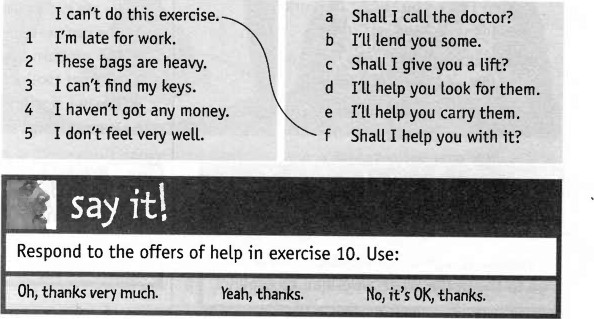
ten
|
your grammar somewhere / anywhere / nowhere Look at the table.
Look at the examples. There was nowhere to sit on the train so we had to stand.
They went to live somewhere in Spain. Complete the sentences with somewhere, nowhere, or anywhere. Did you go guytere_yesterday? 1
Is there 2
3 I'm bored, there's 4 Did Jamal and Tony go at the weekend? 5
6 There was to go, so we stayed at home. 7 Jemma bought a beautiful bag in town. 8 We stayed in a hotel in the town centre. 9
The children
were bored because there was |
|
mouth /ao/ |
hours, |
|
group /u:/ |
|
|
doubte IA/ |
couple, |
|
took /o/ |
|
11 Underling the correct spelling.
It takes a coople / ç.Q.unle Of hoors / hours by plane.
![]() This is my new hoosc / house.
This is my new hoosc / house.
2 Coold / Could I have a spoon / spoun, please?
3 I've got toothache / touthache.
4 What's the matter with your foot / fout?
5 Woold / Would you like a cup of coffee?
6 How many coontries / countries did you visit?
7 It's aboot / about 50 miles.
8 This is my coosin I cousin, Elena.
Put the underlined words in the correct row.
Tick (V) when you've done these sections.
natural English
C] How long does it take? ![]() agreeing and disagreeing get buy)
recommending: should + verb
agreeing and disagreeing get buy)
recommending: should + verb
grammar
[2 comparative adjectives superlative adjectives expand your grammar too + adjective
vocabulary
shops and products ![]() adjectives (3) expand your vocabulary travel nouns
adjectives (3) expand your vocabulary travel nouns
 A to B
A to B
1 Read the texts.
For Valentine's Day I took my wife, Sandra, to Venice on the Orient
Express train. We left London On Sunday morning, travelled through France, Switzerland, and Austria, and arrived in Venice on Monday evening. The journey was great and the train was very comfortable. There were three restaurants on the train and the meals were excellent.
It was expensive; I paid over £1,000 for each ticket, but it was fantastic. (Sam, London)
![]()
|
|
I visited my friend Rosanna in Venice last week. I got a plane ticket on the Internet for £25. The journey usually takes a couple of hours but we were delayed for four hours. The plane was awful. The seats were small, there was nothing to eat or drink, and there was no film to watch. There were lots of very noisy children on the plane too. I was very happy to get Off the plane in Italy. 'Then I found out that my bag wasn't on the plane
natural English How long does it take?
2 Put sentences a to f into the conversation.
a How long does it take to get to the town centre b It took ten minutes in the taxi c Well, the flight only takes a couple of hours d Not long by car
It took four hours to fix the problem
R = Rosanna; M = Michael
R Michael! You're here!
M Hi Rosanna. It's great to see you. How are you?
R I'm fine, but you look tired. _e_ ?
![]() but we were delayed in London.
but we were delayed in London.
R Why?
M Oh, I'm not sure. I think there was something wrong with the plane.
2
R How was the journey from the airport?
3 Complete the sentences. Write the comparative forms of the adjectives in (brackets).
Small cars are (easy) easier to park than buses.
![]() Rollerblading is (dangerous) than walking.
Rollerblading is (dangerous) than walking.
2 Riding a motorbike in winter is (cold) than travelling on a plane.
3 My car is (old) than yours.
4 Walking is (healthy) than driving.
5 ![]()

4 Correct the mistakes.
3
eleven
|
travel nouns Match the words and pictures.
Underline the correct word or phrase. Do you often have to go on business_trips/cruises for your company? 1 They went On a six-week tour / excursion of South America. 2 It was a nice day so we went for a drive/cruise. 3 The flight/drive from London to Sydney took 23 hours. 4 We went for a drive/tour in HenVs new car. 5 The excursion/business trip to Pompeii costs 200 euros. 6 Every year I go on a cruise/excursion around the Mediterranean Sea.
|
5 Look at the pictures (opposite). Find eight more products in the puzzle. Match them with the shops below.
C H A
P H x
R R x
A
D ![]()
![]() A s p 1 R 1 N B
A s p 1 R 1 N B
![]() P E M R E U
P E M R E U ![]()
![]() A s s
A s s![]() T E s
T E s
supermarket ![]() chemist
chemist
2 department store
3 butcher's 4 furniture shop
5 record shop
6 post office
7 clothes shop
6 Order the words to make sentences.
When / new / car / get / Rudy / did / his ? When did Rudy get his new car?
![]() did / What/ you / at / baker's /
get/ the ?
did / What/ you / at / baker's /
get/ the ?
2 
3 I I envelopes/ get/ VVhere / some / can ?
4
We / get / to /
some / have / chairs ![]()
5 did / Where / get / bag / you / that ?
![]()
![]()
![]() how to
how to
8 Match I to 5 and a to f.
You should try that a les a great country and you can new Mexican restaurant.practise your English there. 1 Don't stay in that hotel.b You can buy cheap fruit and
2 You should hire a car.vegetables there. c The food's great. 3 Don't take the bus. d The train is cheaper and faster. 4 You should go to Australia. e IYs a good way to see the country. 5 You should go to the market.
f It's really dirty. There's a better one near the town centre.
adjectives (3) 9 Write the superlative forms of the adjectives in (brackets).
7 ![]() Choose the correct word to complete
the sentences.
Choose the correct word to complete
the sentences.
'John' is a very C_ English name.
a healthy b rich c common
I
Playing sports keeps you ![]() a poor b healthy c lucky
a poor b healthy c lucky
2 We had a — meal in that new restaurant in town.
a wonderful b common c lucky 3 Football is the most — sport in
Slovakia.
a rich b popular c busy
5 The town centre was quite ![]() Saturday.
Saturday.
a wonderful b modern c busy
6 In China eight and nine are ![]() numbers.
numbers.
a lucky b rich c common
7 He's very ![]() • he's got no money.
• he's got no money.
a modern b common c poor
8 1'd prefer to live in a — flat in the city Centre.
a healthy b modern c busy
8 You have to be — to buy a house in Monaco.
a rich b common c popular
eleven
|
too + adjective Look at the examples. I can't buy a coat. They're too expensive. I cant work. Its too hot. I want to go back to Australia. les too cold here. Make sentences using too + the adjectives in the box. late noisy difficult tired small modern hot big A Can we stay at this hotel? B No, it's t0Q.exae-nsiye-. We don't have much money. Do you like this town? B No, it's 2 A Is this room OK? B
NO, it's 3 A Are you going to learn Chinese? B
NO, it's 4 A I want to go to Africa. B
Africa's 5 A Do you prefer to live in a city or a village? B
Cities are 6 A Which train goes to Oxford? B
I'm sorry,
you're The Oxford train left five minutes ago. 7 A Why do you want to take the train to work today? B
Because I'm 8 A Why do you need a smaller travel bag? B
This one is |
10 Write sentences using the superlatives in (brackets). Use is or has.
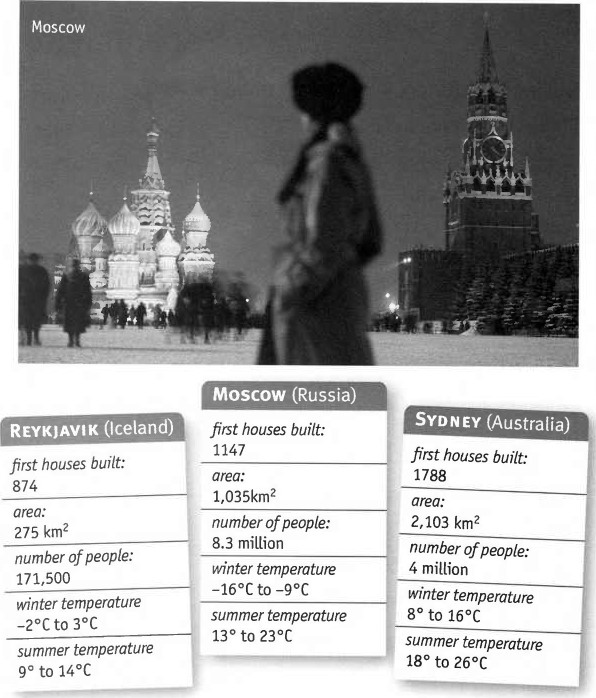
Reykjavik
is the oldest city,![]() (oldest)
(oldest)
![]() (hottest summers)
(hottest summers)
2
![]() (biggest)
(biggest)
3
![]() (newest) 4
(newest) 4 ![]() (coldest winters)
(coldest winters)
5
![]() (most people)
(most people)
6
![]() (smallest) 7
(smallest) 7 ![]() (coldest summers)
(coldest summers)
8 ![]() (fewest people)
(fewest people)

Tick G/) when you've done these sections.
natural English ![]() How about you?
How about you?
![]() phoning a friend
phoning a friend ![]() telephone introductions
telephone introductions ![]() showing you (don't) understand
showing you (don't) understand
![]()
grammar ![]() present continuous present simple vs
continuous
present continuous present simple vs
continuous ![]() expand your grammar verbs not usually used in the continuous
expand your grammar verbs not usually used in the continuous
vocabulary
C] clothes ![]() telephoning
telephoning ![]() expand your vocabulary mobile phones
expand your vocabulary mobile phones
 are they?
are they?
natural English How about you?
|
f My brother. How about you?
|
|
Have you got any friends here? |
a Yeah, French and Arabic. How about you? |
|
1 Who do you go on holiday with? |
b One or two. How about you? |
|
2 Do you speak any other languages? |
c At the shopping centre in town. How about you? |
|
3 When did you meet your girlfriend? |
d Yeah, once or twice a week. |
|
4 Do you often go out with the |
How about you? |
|
people you work with? |
e A couple of years ago. |
|
5 Where do you buy your clothes? |
How about you? |
1 Match
the questions and answers.
2 Write the names Of the people in the picture. Naila and Karen are sitting on the sofa talking.
Karen and Carlos are smoking.
Kevin and John are smiling.
Rebecca is standing near a window and listening to a man.
Rebecca and Naila are drinking wine.
Chang is talking to a young woman.
Maria and Gemma are dancing in the middle of the room.
Kevin and Chang are holding plates of food.
Maria and Naila are wearing trousers.
John and Kevin are talking.
John is wearing glasses.
3 Rewrite the sentences correctly. They going to school.
They
are going to school.![]()
![]() I is talking to my friends.
I is talking to my friends.
![]()
2 Is Tomás and Luis working today?
![]()
3 They aren't smokking.
![]()
4 She listening to her CDs.
![]()
5 What she wearing?
![]()
6 We isn't playing computer games.
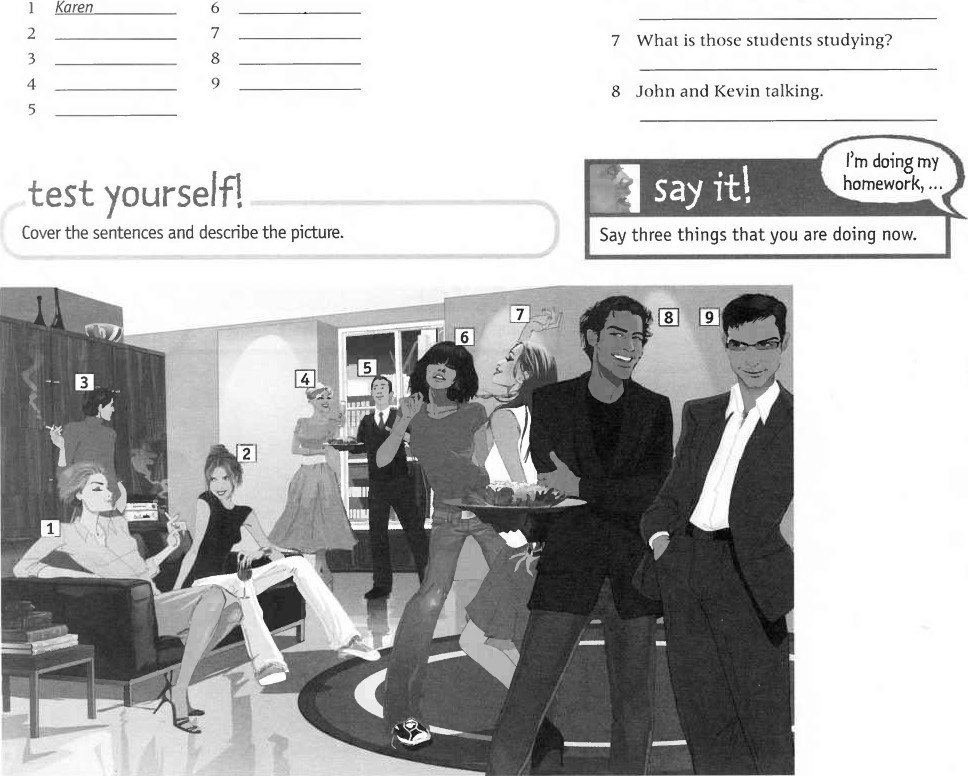
twelve
telephoning
1
![]()
![]() wordbooster
wordbooster
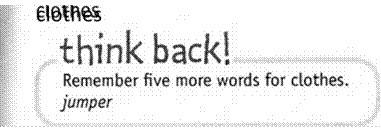
![]() 4 Order the letters for the clothes.
DO the puzzle and find a new word.
4 Order the letters for the clothes.
DO the puzzle and find a new word.
![]() tobos boots
tobos boots![]()
2 srdes
3
![]()
![]() tha
tha
4 tskri
5
![]()
![]() njesa
njesa
6 catkej
![]() 7 rsith
7 rsith
8 urtoesrs
9 (new word)
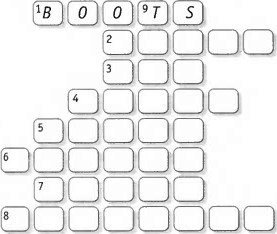

5 Choose the correct word. Did anyone when I was out? a engage b call c message
![]() Terry Brown
Terry Brown ![]() a message for you. a rang b left c
phoned
a message for you. a rang b left c
phoned
2
I phoned but she
wasn't there. I got her ![]() a answerphone b no answer c number
a answerphone b no answer c number
3
Rita's busy at the
moment. Can you ![]() later? a engage b ring back c leave a message
later? a engage b ring back c leave a message
4
![]() called you three times last night but your phone was a engaged b no
answer c answerphone
called you three times last night but your phone was a engaged b no
answer c answerphone
|
mobile phones
phone charger 2 hands-free set 3 C] top-up card 4 voicemail 5 C] text message Match the beginnings and endings of the sentences.
1 He uses a hands-free setb my voicemail. 2 I need to buy C text messages every day. 3 She sends him d is very loud. 4 Your ringtone e in the car. 5 Gema borrowed my phone charger and lost it. |
5
I need to ring
Chao today but I haven't got his ![]() a answerphone b message c number
a answerphone b message c number
 use the phone
use the phone6 ![]() the correct form of the verb.
the correct form of the verb.
|
Sanjiv Emilio, what do you do /are-YON_dQi.ng? Emilio I Itext/'m texting Joe to ask him to play football tonight. Sanjiv But today's Wednesday and we always 2 play/are playing football on Wednesdays! Emilio Yeah, but I got a new phone yesterday and | 3 practise/'m practising. Sanjiv Wow, thaft great! 4 Does it take/ Is it taking photos? |
|
|
|
|
|
Jemma Kevin, the phone 5 rings/ 's ringing. Kevin Well, I can't answer it, 1 6have/'m having a bath. |
|
|
|
|
|
|
Irina DO you want to come over to my house? rve got the new Brad Pitt DVD.
Linda Great idea — are your parents in?
|
expuc)g ammar verbs not usually used in the continuous
understand Majed understands English. Majed.:s.uqdes-taad.ing English. like They like football. They¼e4ikiag football. need Why do you need a new car? Why aæ-you-needüag a new car? want DO you want to go out?
know He doesn't know my brother. He Underline the correct words. When 1 Are you liking/ Do you like playing tennis? 2 He wants/ is wanting a glass of water. 3 Does she need/ Is she needing any help with her homework? 4 I don't understand/ am not understanding this word. 5 Do you know /Are you knowing my teacher? Write the correct form of the verb in (brackets). What time do-UOU-WOŒ_ (want) to meet me tonight? Bruno is-dúing— (drive) to work today. 1
They 2
The students 3
The children
usually 4
5
6 We (not/go) for a drink after work tonight. 7
He 8
When |
Irina Oh no, they're out. They 7 go /are going to the gym every Tuesday and then they usually 8 meet/ are meeting some friends for a drink. Linda Okay, I'll phone my mum and tell her. She 9 works/'s working in London today.
Irina Really? What 10 does your mum do/'s your mum doing? Linda Oh, she'S an engineer with a big Oil company.
twelve
7 Put the telephone conversation in order.
![]() Sun ita Hello?
Sun ita Hello?
![]() Hi
Sally. the matter?
Hi
Sally. the matter?
Sunita c Yes, please.
|
Sally |
4 |
e |
Yeah, it is. |
|
|
|
f |
Hi, iYs Sally. |
|
Sunita |
6 |
g |
Thanks a lot, Sunita. |
|
sally |
|
h |
Well, I need some help with my homework. |
|
Sunita |
8 |
|
Shall I come to your flat? |
![]() Sally d Okay, see you about 15
minutes. Sunita
Sally d Okay, see you about 15
minutes. Sunita
sally Bye.
8 Complete the conversation with a suitable word. There may be more than one possible answer.
R = receptionist; E = Elizabeth
R Good morning, International English Learning Centre.
E Good morning. CQu_U-Can—— I speak to Jenny Jones, please?
![]() R Who's ,
please?
R Who's ,
please?
E My 's Elizabeth Richardson. I work at the university.
R Just a minute I'm sorry, Jenny's teaching at the moment.
![]() Would you like to leave a
Would you like to leave a
E Yes, please. Could you ask Jenny to
R Certainly, what's your
E My office number is 678945 and the best time to call is after lunch.
R Okay, So that's Elizabeth Richardson, telephone number 678945, and you want Jenny to call after lunch. E That's right. Thanks very much.

9 ![]() the phrases that Javier uses to show
that he understands/ doesn't understand.
the phrases that Javier uses to show
that he understands/ doesn't understand.
M = Michelle; J = Javier M What do you fancy doing today?
J Sorry?
M What do you want to do?
J Ah! OK. Well, I have to buy some presents for my family. M You should go to Harrods.
J Pardon? Who is Harry?
M Harrods. It's a big department store.
J Oh yes, Harrods. How do I get there?
M By train and tube.
J Sorry, what's a 'tube'?
M It's like the metro in Barcelona.
J Oh, 1 see.
M Look here's a map. Take the train to Richmond, get on the District line tube, change at Earl's Court and get the
Piccadilly Line tube to Knightsbridge.
J Er,... Could you repeat that? M Don't worry, I can take you.
10 ![]() the words that begin with two
consonant sounds. Say the words.
the words that begin with two
consonant sounds. Say the words.
He in winter.
![]() How do you spell your name?
How do you spell your name?
2 Her cat sleeps all day.
3 I need some new clothes for work.
4 We travel a lot.
5 Did you have breakfast?
Tick (V) when you've done these sections.
natural English ![]() new life
new life
![]()
![]() What are you doing tonight?
What are you doing tonight?
inviting and responding making plans together
grammar be going to + verb might + verb
vocabulary
[2 verb + preposition
![]()
![]()
C] kinds Of film
1 Are the sentences true Or false
Joe's going to travel for one year. ![]()
![]() Joe and Sally are going to learn a
foreign language.
Joe and Sally are going to learn a
foreign language.
2 Sally's going to work with children.
3 Sally's going to visit Spain.
4 Sally is going to dance.
5 Joe and Sally are going to work abroad.
6 Joe and Sally are going to visit South America.
7 Joe's going to study at university after his gap year. 8 Sally's going to travel for six months.
thirteen
lans
|
g] |
|
Hi Mum! Hi Dad! It's Day 10 of my trip and I'm in Paris. It's great here! I met somebody called Tom on the train yesterday, and he's on a gap year too. We're staying in a hotel near the city centre. Tonight we're going to go up the Eiffel Tower, then walk or take the metro to the Latin Quarter. Tomorrow I want to go to Versailles but it might be closed on Mondays. On Tuesday Tom and I have to get up very early to catch the train to Strasbourg. We've booked a room at the hostel there. After Strasbourg, I'm not sure; I want to go to Berlin but Tom has a friend in Munich and he says we can stay there. Anyway, I hope you're OK. Bye for now Joe n |
|
|
this Friday next Monday at the weekend tomorrow the day after tomorrow |
||
|
2 Read the text. Write might or is/ are going to. |
A What are you doing
tonight? |
||
|
|
Joe and Tom might— walk to |
B Not much, I'm really tired and I don't want go out. |
|
|
the Latin Quarter. |
|
||
|
|
Joe |
visit Versailles |
|
|
|
on Monday. |
|
B I'm going to the cinema with a couple Of my friends. |
|
2 |
Joe |
catch a train on |
2
|
|
|
Tuesday. |
|
B Oh, I always play football at the sports centre on Thursdays. |
|
3 |
Joe |
stay in a hostel |
|
|
|
in Strasbourg. |
|
3
|
|
4 |
Tom |
travel to |
B I'm taking the car to the garage and going shopping for clothes. |
|
|
Strasbourg with Joe. |
|
4
|
|
5 |
Joe |
travel to |
B I'm not sure. I might go skiing. |
|
|
Munich. |
|
5
|
natural English What are you doing tonight?
Tuesday Saturday
?$kiing
Wednesday Sunday cinewta (Pirates of the ?skiing Caribbean) Luis & Ana
Thursday M onday football — sports centre Rxrsian lesson
? drink With
Friday take car ? ¶arqqe buy new jnmper
B I've got a Russian lesson and I might go for a drink with Luis.
![]()
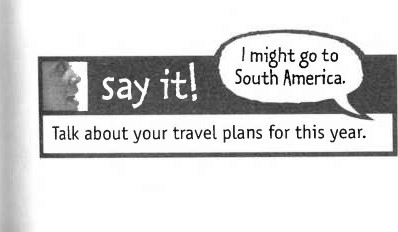 thirteen
thirteen
 wordbooster verb + preposition kinds
of film
wordbooster verb + preposition kinds
of film4 Match the beginnings and endings of the sentences.
![]() How long did you have to waita about
the exam?
How long did you have to waita about
the exam?
1 I spokeb on new clothes for her children.
2 Carlos didn't agreec to some music?
3 I can't go out tonight.d to Jim yesterday evening.
I have to look
|
5 Elena spent of her money |
|
|
6 We paid €2,000 |
g after my little brother. |
|
7 Are you thinking |
h with the teache(s ideas. |
|
8 Do you want to listen |
|
4
![]() Did you
speake for the train tickets. all for the bus this morning?
Did you
speake for the train tickets. all for the bus this morning?
think back!
Remember five more kinds of film. comedy
6 Find eight kinds Of film in the puzzle.
Complete the words.
![]() comedy
comedy
comedy
film
|
|
|
R |
o |
|
A |
|
|
|
c |
|
A |
B |
|
natural English |
Do you ever . . . ? |
N |
M |
|
Y |
c |
z |
|
A |
s |
|
|
![]()
![]()
![]()
![]()
![]()
![]()
![]() 5 Order the words to make
questions.sT R RT B play I Do basketball / ever / you ?A x H DO you ever play
basketball?c P L R LH O O
5 Order the words to make
questions.sT R RT B play I Do basketball / ever / you ?A x H DO you ever play
basketball?c P L R LH O O
![]()
![]()
![]() the I
you / DO / go / cinema / in / ever/ the / to / afternoon ?A Q L 1 P
o N NR
the I
you / DO / go / cinema / in / ever/ the / to / afternoon ?A Q L 1 P
o N NR
![]() T H LN
L E R
T H LN
L E R
![]()
![]() A
E LT L
w G R
A
E LT L
w G R
![]()
4
5 he I Does / watch / ever/ cartoons ?
![]()

thirteen
 invite someone
invite someone
natural English inviting and responding natural English making plans together
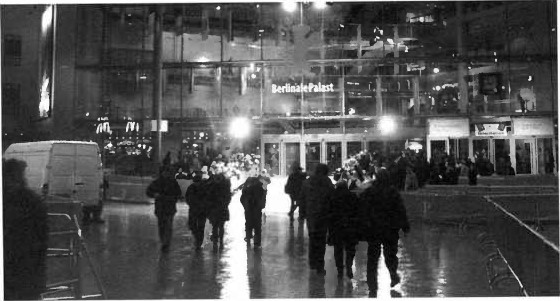 8
8
7 Complete the conversation using the phrases in the box.
|
What's it about Shall I buy |
Where's it on I'm a bit busy |
|
|
what are you doing Do you want |
Would you like to What's on |
|
|
HOW
YO |
|
9 |
|
Ana Jernma, dp YQu want to |
come to the cinema tonight? |
|
![]() Jemma
Sorry,tonight. Ana Luis, after work? Luis Nothing. Why?
Jemma
Sorry,tonight. Ana Luis, after work? Luis Nothing. Why?
![]() Ana to
go and see a film?
Ana to
go and see a film?
Luis the new Robert De Niro film.
Luis
Ana It's a horror film. Luis Yeah,
OK. ![]()
Ana The big Multiplex cinema.
![]() 7 a
meal first? There's a Spanish
7 a
meal first? There's a Spanish
Luisgo for restaurant near the Multiplex.
Luis ![]() 8 some
tickets on the Internet? Ana Good idea.
8 some
tickets on the Internet? Ana Good idea.
Underline the phrases that Ana, Luis, and Jernma use to respond
Match the questions and responses.
What shall we do at the weekend? —d— ![]() Good
idea. Where shall we go?
Good
idea. Where shall we go? ![]()
2 OK. How shall we get there?
3 Fine. Where shall we meet?
4
Yes,
OK. When shall we meet? ![]() 5 Yes. What shall we take?
5 Yes. What shall we take?
a By train.
b How about 9.00?
c Some sandwiches and something to drink. d How about a picnic?
e To the beach at Brighton? ![]() At
the station?
At
the station?
Put the telephone conversation in order.
a Fine. What time?
b How about the restaurant?
![]()
d Yeah, 0K. e At 6.00?
![]() Right, so that's 6.00 at the
restaurant.
Right, so that's 6.00 at the
restaurant.
|
Ana Hello. |
|
|
Luis Hi, Ana. It's Luis. |
|
|
Ana |
Oh, hi Luis. |
|
Luis Ana Luis |
I forgot to ask. C—
|
|
Ana Luis |
4
|
|
Ana |
|
|
Luis |
Bye, Ana. |
|
Ana |
Bye. |
to invitations.

thirteen
Tick (V) when you've done these sections.
natural English
![]() How many times ? •ancredible!
How many times ? •ancredible!
![]() have a 4 adjective + noun natural
English How many times . . . ? grammar present perfect (experience) 1 Do the
quiz. How adventurous are you? present perfect and past simple
have a 4 adjective + noun natural
English How many times . . . ? grammar present perfect (experience) 1 Do the
quiz. How adventurous are you? present perfect and past simple
1— 5 Wake up! 6-10 Leave the house and get to know the world. 1 1-15 Don't stop! There's lots more to see and do. 16-20 That's incredible! When do you sleep? |
vocabulary opposites
![]()
[2 feelings fixed phrases
fourteen
2 Read the text and the list.
Teachers Gary Banks and his wife, Tanya. saw a TV programme about the fifty most popular things that people wanted to do before they died. Gary and Tanya wrote a list of things that they want to do before they die. So far, they have done five of the things On the list.
![]() a køt air balloon in South
Africa '04)
a køt air balloon in South
Africa '04)
- see the pyramids in Egypt
- visit Paris and have dinner at the Eiffel ToWer restaurant (May '05)
— do q ho-gee jump i" New Zealand (Dec '04)
— travel the Orient ExpreJ$ train — visit Disneyland the CASA - ride a tamel in Tunisia '04)
- a boat around the warld
- Write a book about aur advent¼re.r
— swim with sharks in Australia (Aug '05)
Are the statements true or false X?
They've done half Of the things on their list. v/
- They've eaten in a restaurant in Paris.
2 They haven't written a book.
4 They've been to Egypt.
5 They haven't flown a hot air balloon. write it!
Write a list of ten things that you haven't done but want to do before you die.
I haven't been in an aeroplane.
grammar present perfect and past simple
3 Underline the correct form.
|
Mila |
Did you ever go / Have yQ11 ever been to New Zealand? |
|
Jack |
Yes, I I did / have. |
|
Naila |
When 2did you go / have you been? |
|
Jack |
Last summer. 3 Did you ever go / Have you ever been? |
|
Naila |
No. My sister 4went I has been there last year but | 5 didn't go / haven't been with her. |
|
Jack |
Why not? |
|
Naila |
1 6didn't have / haven't had any money. |
|
Jack |
Well, it's a great place to go and the people are very friendly. |
|
Naila |
Where 7 did you stay / have you stayed? |
|
Jack |
In hostels mostly, but sometimes 1 8stayed / have stayed with friends. |
|
Naila |
9 Did you do / Have you done anything exciting when you were there? |
|
Jack |
Well, I Iodid / 've done a bungee jump from a bridge. |
|
Naila |
That's amazing! |
fourteen
 wordbòoster opposites think
back!
wordbòoster opposites think
back!
4
Order the letters
to make verbs or adverbs. 
6 Complete the e-mail. Use the words in the box. There are two
![]() I lelw extra
words.
I lelw extra
words.
2 spsa excited frightened ![]() pleased
pleased![]() nervous
nervous ![]()
3 ![]() brrmmeee surprised embarrassed angry
brrmmeee surprised embarrassed angry
4 ants
|
|
|
|
Hi Sue!
Next week I'm going to Warsaw for a meeting. I'm quite Well, I better go. I've got lots to do before Monday. Take care, Maria xx |
|
5 ![]()
![]() sole
sole ![]()
6 dbyla ![]()
8 niisfh
9
![]() efrgot
efrgot ![]()
10 ifla ![]() seol IQse—
seol IQse—
5 Match the words (in A) with their opposites (in B).
find/(Qse
test yourself!
Cover circle A. Say the opposites of the words in circle B.
fourteen
8 Underling the correct phrase.
A Sandra, I'm going to work now.
B Have a nice holiday. / Have a nice day. A We're going skiing next week.
B Well, have a great time! / have a nice day!
|
I They didn't offer me the job. |
2 1'm really sorry. I've broken |
2 A I'm going to Spain tomorrow. |
|
a Congratulations! |
your glass. |
B Have a nice evening! /Have a lovely |
|
b Good luck! |
a Thanks a lot. |
holiday! |
|
c That's a shame! |
b Don't worry. |
A Thanks! |
|
|
c Have a good time. |
3 A I'm going out for a meal with Andy after |
![]() work.
work.
B Have a good weekend. / Have a nice everung.
4 A Well, it's Friday and it's 5 0'clock so I'm going home! See you on Monday.
|
3 1've won the lottery! 4 We got you this book for your |
5 A We're going to have a picnic on Sunday. |
|
a What a shame! birthday. b I'm really sorry. a Thanks a lot. |
B Have a nice evening. / Have a lovely day. |
|
c Congratulations! b Good luck! c Congratulations! |
pronunciation linking 9 Mark the linked sounds. |
|
5 1've got an exam in the morning. 6 We're going on holiday a Have a good time. next week. b That's great. a I'm really sorry. c Good luck! b Have a good time. c That's a shame. |
5 I've never met anyone famous. 6 I've driven a Ferrari. 7 I've written a book. 8 I've learned a lot Of English! |
![]() I've
neve\been in love.
I've
neve\been in love.
![]() I've run a marathon.
I've run a marathon.
2 I've visited Italy twice.
3 I've never lived alone.
4 I've been in hospital several times.
|
|
|
|||||||||||||||||||||||
fourteen
Hi. my name's Tomás.
Nice to meet you.
3 Hello, I'm Sandra.
4 Hello. my name's Rebecca.
5 Ni«• 10 meet you, Rebecca.
say it!
1 Is Katia from Barcelona?
No. she isn't.
Is Katia married?
No. she isn't.
Is Tomás from Poland?
No. he isn't.
4 Is Tomás single?
No. he isn't.
Is Katia a doctor?
Yes, shc is.
6 Is Tomás from Spain?
Yes. he is.
7 Is Tomás forty? Yes, he is.
8 Is Katia thirty?
Yes. she is.
U R N A
4 1 an
an 5 an
forty-eight
3 thirlecn
4 twenty-one
5 sixty-seven 6 fifty-nine say it! students' own answers
'S Thai
're German
's French
4 's .lapancse
5 're Polish
's Argentinian / Argentine
's Italian
8 •re Chinese
|
the |
5 the |
|
4 the |
8 the |
1 Budapest is in the Hungary.
Rick is from the United States.
HOW 2 Fine' Very well yo n 4 Very
5 thanks
orange 2 diet mineral
4 rcd
5 black
10 1 Would you likea glass of wine?
2 Would you like tea with letnon?
3 Yes, a dict cola. please. 4 Would you likea hot chocolate?
5 Yes. a mineral water, please.
say it! Would you like . a mineral water? a black coffee? a glass of orange juice? a diet kt)la?
2 eyv
glass
1 bottle can
3 mug carton cup
1 glass
2 bottles carton 4 mug cans
ICJ r. l, m. n. s. x and z (in Br Eng)
letters not in the circles arc o and r say it! students' Own answers write it! students' Own answers 12 1 a
a
|
computer |
eyg |
|
2 laptop |
1 Javier has got two English |
|
camera CD player |
dictionaries. |
|
printer |
3 How many people are |
|
laptop is not in the puzzle |
in class? 4 Three glasses 01 while wine. please. |
|
o 0 |
5 Guilia and Emilio have got |
|
p E E Y T R P U |
four children. 6 Thc -we-t-t-t-a+-s women at the party are from Brazil. 8 I think the new |
|
H O E |
computers are great. |
|
w A Y |
magazine 6 dictionary 3 lighter 7 notebook 4 key 8 newspaper 5 travel card 9 hricfcasc |
|
say it! pronunciation |
say it! students' Own answers |
|
computer. printer, player |
6 1 Whcrc is Brigitte's calculator? |
|
camera. mobile phone, laptop |
2 Gianni's homework is difficult. |
|
students' Own answers |
3 Brad is Julia's boyfriend. |
|
things |
4 Arc lhcy Simon's courscbooks? |
|
thing |
5 Maria's new bag is yellow. |
|
3 things thing |
7 (see below) |
|
5 things |
say it! pronunciation |
|
Have 6 Has |
lerrible, dillcrcnl, similar. |
|
2 haven't 7 has |
imeresting. noisy, |
|
3 Has Have |
dangerous. expensive |
|
4 has have 've |
students' own answers |
|
5 haven't 10 have |
8 I f 3 b 4 a |
|
expensive |
say it! possible answers |
|
CD players |
Can I borrow / look al your dictionary? |
|
necessary |
Can you turn off the fan? |
|
4 mobile phones |
Can turn on the light? |
|
useful |
Can you help me? |
|
write it! students' own answers |
9 1 this is 5 Those are |
|
eyv |
2 that's 6 This is 3 those these 4 Is that 8 that's |
|
a |
10 1 c 2 b 3 a 4 1 5 d Il l a |
eyg
I computers boxcs women country class desks
4 person 8 nmionalities
7
4 5 London is in the United Kingdom.
answer key
|
glass |
|
|
1 bottle |
|
|
can |
|
|
mug |
|
|
4 carton |
|
|
cup |
(.0 |
5 haven't 10 have 8 1 1 2 c 3 b 4 a 5 c
a
expensive say it! possible answers 4 an
2 CD players Can I borrow / look at your dictionary? 3 necessary Can you turn off the fan? forty-eight4 mobile phones Can I turn on the light?
thirteen5 useful Can you help me?
4 lwenty-oncwrite it! students' own answers 9 1 this is 5 Those arc sixty-seven that's 6 This is
2
6 fifty-nine 1 glass eyv 3 those 7 these
2 bottles
say it! students' own answers carton 4 Is that 8 that's
6 1 's Thai 4 mug 10 2 b 3 a 41 5 d
'rc German cans
11 1
3 •s French 11 lei,' a. h. j. k eyg
|
one |
|
two |
|
|
Hi. my name's Tomás. |
How |
computer |
eyg |
|
Nicc to meet you. |
2 Fine Very well |
laptop |
1 Javier has got two English |
|
3 Hello. I'm Sandro. |
3 you |
camera |
dictionaries. |
|
4 Hello. my name's Rebecca. |
4 Very |
4 CD player |
|
|
5 Nice to meet you. Rebecca. |
5 thanks |
printer |
3 How many persons people are |
|
|
8 1 i 5 b |
laptop is not in the puzzle |
in your class? |
|
2 |
6 h |
|
4 Thrcc glass glasses of whitc |
|
|
c |
|
wine, please. |
|
|
|
w |
5 Guilia and Emilio have got |
|
|
|
E E Y T R P U |
four ehikhety children. |
|
say it! |
9 1 orange |
|
6 The -we-mans women at the |
|
1 Is Katia from Barcelona? |
2 diet |
|
party are from Brazil. |
|
No. she isn't. |
mineral |
|
|
|
Is Katia married? |
4 red |
|
8 think the new |
|
No. she isn't. |
5 black |
|
computers are great. |
|
3 Is Tomás from Poland? |
|
w |
|
|
No, he isn't. |
10 1 Would you likc a glass of |
|
magazine 6 dictionary |
|
4 Is Tomás single? |
wine? |
0 |
3 lighter 7 notebook |
|
No. hc isn't. |
2 Would you like tea with |
|
4 key 8 newspaper |
|
5 Is Katia a doaor? |
lemon? |
|
5 travel card 9 briefcase |
|
Yes, she is. |
3 Yes, a diet cola. please. |
|
say it! students' own answers |
|
6 Is Tomás from Spain? |
4 Would you like a hot |
say it! pronunciation |
|
|
Yes. he is. |
chodate? |
computer. pnnter, player |
6 1 Where is Brigitte's calculator? |
|
7 Is Tomás forty? |
5 Yes. a mineral water, please. |
camera. mobile phone, l@2top |
2 Gianni's hotncwork is difficult. |
|
Yes. he is. |
it! |
own answers |
3 Brad is Julia's boyfriend. |
|
8 Is Katia thirty? |
say Would you like |
2 1 things |
4 Are they Simon's coursebooks? |
|
Yes. she is. |
a mineral water? |
2 thing |
5 Maria's new bag is yellow. |
|
3 L A W Y E |
a black coffee? |
3 things |
7 (see below) |
|
S H o P A S S I S T A N T |
a glass of orange juice? |
4 thing |
|
|
L I C E O F F I C E R |
a diet cola? |
5 things |
say it! pronunciation |
|
A C T O R |
|
6 Has |
lcrrible, different, similar. |
|
B U S I N S M A |
|
haven't 7 has |
boring. inlercsting. noisy, |
|
U R N A |
|
3 Has 8 Have |
Oct, dangerous. expensive |
|
4 1 an |
|
4 has 9 havc / 've |
students' own answers |
4 •s Japancsc lit/ b, c, d, e, g, v 1 computers boxcs
•rc Polish lad i, y women country
6 •s Argentinian/ Argcntinc class desks 7 •s Italian and z (in Br Eng) 4 person 8 nationalities
8 •re Chincsc
lu:l q, u, w letters not in the circles arc
1 the 5 thc o and r 7
say it! students' own answers
4 the 8 thc write it! students' awn answers
1 Budapest is in the Hungary. 12 1 a 2 Rick is from the United States.
4
5 London is in the United Kingdom.
9
![]() 1 don't
like 8 goes quite like 7 quite like
1 don't
like 8 goes quite like 7 quite like
3 really like 8 don't like say it! students' own answers really like 9 hate
5 quite like really like eyv 1 e
say it! students'Own answers
10 1 drives 5 reads lives 6 cats
3 listens 7 drinks say it! students' own answers
4 st tidies 8 plays
George sleeps about nine 11 1 Yes. she does. hours a night.
2 No, she doesn't. Magda works about seven No, she doesn't. hours a day.
4 Yes, she does. Miguel studies English about 5 No, she doesn't. two hours a week. 4 John and Kay watch TV about tennis court lour hours a night.
2 dance studio 5 Javier plays computer games swimming pool about one hour a day.
4 fitness room changing room eyg
I Have a bath. studio
2 Take the bus. fitness room
3 Clean the bathroom. courts
4 Make your beds. pool
5 Go to bed. court
I never read adventure stories. c somctimes read sports
1 We love skiing but we hate magazines.
swimming. d 1 usually read love stories.
2 They drink tea and coffee. read on the bus.
I oltcn
3 1 don't like skiing because it's
car I hardly evcr buy books. dangerous.
4 HC plays football but he doesn't
say it! students'Own answers play basketball. 4 1 c
5 like my room becausc it's quiet.
6
1 cooking 5 skiing 6 1 don't likc this exercise because
2 driving 6 travelling it's difficult.
3 playing 7 dancing 7 Mona speaks Italian and Russian.
4 shopping 8 sightseeing 8 Enrique likes sightseeing and own answers
say it! students' shopping.
![]()
7
say it! students' own answers
autumn 2 months summer 4 March
5 August
6
![]()
![]() 1 at on
1 at on
4 at on on 7 during 8 at
say it! on Wednesday. at 2 p.m., on January 2 Isl. at the weekend. during the week, in March. at the moment, in the winter, between
2.30 and 3.30
7 1 Mike
2 Harry
3 Sylvia
4 Dave
5 John
Camilla 7 Jenny
8 James
9 Rachel 10 Rosie
b (No, I haven't.)
2 a (Yes, I'vcgot two.) d (Yes. t've got onc brother and two sisters.)
4 f (Yes, I've got two nephews and two nieces.)
5 c (Yes, I've got three.)
9 1 Our
her
4 his
5 Thcir my her its
write it! students' own answer
10 1 Belinda I John
2 Bclinda / Patricia
3 Patricia / Jamic
4 Bob / Belinda
5 Jamic I Patricia
11/0/ birthday. month, fifth. thanks
10/ together, their, the, brother
say it! students' own answers
|
1 1 toast |
|
|
|
cleans |
|
|
2 sausage |
some |
|
2 Bridge |
meet |
|
|
3 bacon |
some |
|
Museum |
3 go |
|
|
4 cheese/ ham |
|
|
Market |
4 stays |
|
|
5 cereal |
some |
|
5 Castle |
goes out |
|
|
6 bread/ honey 7 coffee |
some |
|
|
6 do 7 play |
|
|
8 juice |
7 1 coffcc ice-cream |
|
guidebook 3 walking shoes |
8 washes |
|
|
2 1 They always have cereal. |
3 sandwich |
|
4 sunglasses |
Lovely |
|
|
2 He often has sandwiches. |
4 wine |
|
5 streetmap |
mcc |
|
|
3 1 never have lunch. 4 We sometimes have Indian |
juice |
|
6 backpack |
3 boring 4 terrible |
|
|
food. |
|
|
say it! students' own answers |
Interesting |
|
|
5 She usually has pasta. |
1 strawberry |
1 dairy |
|
|
|
|
|
grapes |
2 grapes |
The tickets was/ very |
write it! students' own answers |
|
|
say it! students' own answers |
3 bananas |
mea t |
expensive. |
|
|
|
|
|
4 pepper |
4 carrots |
We was at the tourist |
watched |
|
think back! |
|
carrot |
5 banana |
office at 8 a.m. but our bus |
2 bought |
|
cheese (u) |
apple (c) |
sweetcorn |
|
were late. |
3 decided |
|
sandwich (c) |
honey (u) |
cream |
|
The bus I were cold and |
4 met |
|
sausage (c) |
tea (u) |
8 yoghurt |
|
the seats was |
5 got up |
|
|
|
9 pork chop |
|
uncomfortable. |
6 wanted |
|
3 1 a |
|
10 turkey |
|
4 The driver weren't very friendly. |
7 cleaned 8 liked |
|
|
|
8 1 can |
|
5 The tour guide was/ were very |
went |
|
|
|
can't can't |
|
young and he I were boring. |
10 stayed |
|
|
|
4 can t |
|
6 The museum and the castle |
decided |
|
|
|
can't |
|
was / Closed. |
2 bought |
|
2 |
|
can |
|
The food al the restaurant |
3 stayed |
|
|
|
can |
|
/ were awful. |
4 cleaned |
|
5 |
|
8 can |
|
8 We was very tired at the end of the day. No, they weren't. 2 Yes, it was. |
5 watched 6 liked 7 had 8 got up went |
|
chcap 2 uncomfortable 3 clean 4 excellent |
|
|
|
NO, he wasn't. 4 Yes, it was. 5 Yes, they were. |
10 met 1 before |
|
5 slow |
|
|
|
4 see quiz answers underneath quiz 1 The Coliseum and the Vatican |
2 after 3 after |
|
write it! students' own answers |
10 c |
|
are both in Rome. 2 China and Thailand are both |
4 bcfore 5 after |
|
|
chickcn |
say it! students' own answers |
Asian countries. |
|
||
|
3 steak |
|
The White House and Camp |
10 1 That |
||
|
4 mushroom |
10 1 some more |
David are both homes of thc |
2 was |
||
|
onion |
2 some more |
US president. |
3 worry |
||
|
6 chocolate |
3 another |
4 The Nile and the Amazon are |
4 sorry |
||
|
pea s |
4 some more |
both rivers. |
5 Don't |
||
|
8 fish |
5 another |
5 Warsaw and Kraków are both |
|
||
|
9 tomato |
say it! students' own answers |
cities in Poland. |
say it! students' own answers |
||
|
|
|
Our bus was late yesterday |
11 1 a coursebook / boring |
||
|
|
|
morning. |
2 b talk/ sport |
||
|
w |
|
2 1 was tired last night. |
3 b church / were |
||
|
|
|
We wcrc at the museum a few |
4 b shopping/ got |
||
|
|
|
days ago. |
a coffee / Australia |
||
|
u N |
|
Roger was in Thailand in 2001. 5 It was my birthday ten days |
|
||
|
H o o Y N M M |
|
ago. |
|
||
say it! students' own answers say it! students' own answers
was born 2 grew up left
4 went
5 worked
6 became
7 got married 8 had
write it! Students' Own onsweß
He didn't go to university. He didn't work in a gym.
He didn't go to America in 1966.
4 He didn't act in his first American film in 1970.
5 He didn't get married in 1986.
3 1 d e
4 1 X
4
say it! students'own answers
quite tall
3 very tall
4 quite short
5 very short 6 short
medium
2 dark
3 short
4 beard
5 moustache
6 tall
7 blonde
8 Iooking say it! students'own answers
7
|
1 thin (A) |
1 dull |
|
2 funny (C) |
pretty |
|
3 boring (C) |
calm |
|
4 blonde (A) |
4 plump |
|
5 clever (C) |
5 lovely |
|
6 fat (A) |
amusing |
|
7 nice (C) |
7 thin |
|
8 relaxed (C) |
8 blonde |
you me 3 them
4 him
5 him 6 her us
8 it
9 1 friendly
2 Boring
3 clever 4 lazy nice say it! students' own answers
yours
2 hers
3 his
4 ours
5 theirs
1 hers mine ours 4 theirs mine yours
7 his
8 his
9 theirs
10 hers
10 1 When did you last eat french fries? When was the last time you washed your car? When did you last speak English?
4 When did you last play football? When was the last time you t tavelled by train?
say it! students' own answers
3 b
return
2 platform passengers
4 ticket office
5 timetable
How many days did you stay (in the hotel) in Cairo?
2 How many hours were you on the train? How much food did you have on the train?
4 How much money did you take? 5 How much jewellery did you buy?
say it!
1 a few 2 a lot none
4 quite a lot a lot
3 2 car park train station 4 museum cinema 6 school restaurant
8 statue 9 hotel write it! students' own answers
took went come 4 goes take 6 brought 7 bring camc
say it! possible answers book cupboard: Turn left and go along the corridor, then turn right. It's the second door on your right.
Spanish department: •liarn left and go along the corridor, then turn right. It's the second door on your left. stairs: Turn left and go along the corridor, then turn right. Go to lhc end of the corridor, turn right, and it's the first door on your right. coffee room: Thrn right and it's the first door on your right.
lecture room: Turn left and go along the corridor. then turn right. It's the first door on your right.
eyg
8
8 1 journalist
2 sausages
Russia
4 chef
5 fish
6 China
7 teacher
8 chips
isn't are
aren't
are there 2 where sorry 4 there isn't on the
nine
No, you don't.
Yes, you do.
3 No, you don't. No, you don't. No, you don't.
3 1 can t can
4 can't 5 can t
say it! students'own answers
I does was can
5 didn't
6 has
8 has 4 1 a
say it! students' own answers
5 1 f
2 b a
c
6 1 f
7 1 d
e
8
double room en-suite rooms bath shower Internet access parking swimming pool X
gym restaurant X can't bar can't breakfast included X in price 4 can t can
say it! students' own answers
4 1 a
Has the hotel got a pool?
Has it got a restaurant?
3 Is there a gym?
4 Is brcakfast included in the price?
Are there any rooms say it! students'own answers
available?
hair mouth
1 hangers 4 stomach
2 fan 5 eyes
3 pillows 6 teeth
4 kettle 7 shoulder
5 balcony 8 thumb
g fingers
6 1 b
10 I R
write it! students'own answers
6 w
1 backache 1 toothachc
2 toothache 2 headache
say it! students'own answers 3 headache 3 backache
4 earache 4 neckachc
11 l c 5 stomachache earache
say it! students' own answers
think it's bcttcr to stop smoking.
2 I think it's better to ask the teacher.
3 r think it's better to take
8 1 anyone no-one 3 nothing
4 anyone
5 anyone
6 something
Someone
8 anything
3
4
10 l c
say it! students' own answers
eyg
I anywhere somewhere 3 nowherc
4 anywhere
5 somewhere
6 nowhcrc
7 somewhere
8 somewhcrc
9 nowhere
10 somewhere
11 1 house
2 Could/ spoon
3 toothachc
4 foot
5 Would 6 countries about
8 cousin
mouth law hours, about, house
group/ u:] toothache, spoon, soup
the train.
4 I think it's better to look at the map.
5 1 think it's better to buy doubte IAI couple. countries. cousin took / u/ foot, could, would
a new TV.
eleven twelve
1 Sam (in any order) What did you get at the 1 more expensive baker's?
2 easier 2 1 got this shirt in Milan. 3 quieter 3 Where can get some 4 bcltcr envelopes?
5 more interesting 4 Wc have to get some chairs.
5 Where did you get that bag?
Michael (in any order)
6 worse
7 1 b
7 more boring
8 more difficult
9 cheaper
10 noisier a
2 1 c. 3b. 4 a, 5 d
Say it! students' awn answers
more dangerous
2 colder
3 older
4 healthier more common
9 1 friendliest
I agrcc. 2 most comfortable I'm not sure.
longest
3 It depends. 4 most beautiful 4 I'm not so sure.
most famous
5 1 don't agree.
6 cheapest
nicest
Say it! Students' own answers 8 best
write it! students' own answers
1 flight 1 tour
2 cruise 2 drive has the hottest
10 1 Sydney
3 drive flight summers.
4 tour 4 drive is the biggest city.
2 Sydney
5 excursion 5 excursion is the newest city.
Sydney
6 cruise
4 Moscow has the coldest
winters.
say it! students' Own answers 5 Moscow has the most people. 6 Reyjavik is the smallest city.
5
7 Reyjavikhas the CXJldest
summers. w
8 Reyjavik has the fewest people.
say it! students' own answers
H M
M H eyg
100 modern
2 too small
3 too difficult 4 too hot
1 aspirin too noisy
perfume 6 too late
3 lamb tired
too
4 chair
8 too big
cassettes
6 stamps shirt
8 cakcs
say it! students'Own answers
2 2 Naila
Carlos 4 Rebecca
5 Chang
6 Maria
7 Gemma
8 Kevin 9 John
lam talking to my friends.
2 Are Tomas and Luis working today?
3 They aren't smoking.
4 She's listening to her CDs.
What's she wearing? We arcn't playing computer games.
7 What are those students studying?
8 John and Kevin are talking.
say it! students' awn answers
4 2 dress
3 hat
4 skirt
5 jeans 6 jacket shirt
8 trousers
9 trainers
1 B O O T S
2 D R E S S
' H A T 4S K I RT S J E A N S EJ A C K E T
'T R O U S E R S
say it! students' own answers
5 1 b
c
eyv
say it! students' own answers
•m texting
2 play
3 'm practising
4 Does it take
's ringing
6 'm having
7 go
8 meet
9 's working
10 docs your mum do
1 Do you like wants
3 Does she need
4 1 don't understand
5 Do you know
1 don't likc
2 need
3 do
4 Do you understand do you want 6 aren't going
7 isn't walking
8 do you need
7 1
calling I speaking
name message
4 phone / ring I call 5 number
write it! Students' answers
9 understands:
Ah, OK. Oh yes. Oh. I see. doesn't understand: Pardon? Sorry? Could you repeat that?
10 1
2 Sleeps
3 Clothes 4 travel breakfast
thirteen
8
might is going to going 10
4 is going to 5 might
say it! students' own answers
3 1 What are you doing tomorrow?
2 What are you doing the day after tomorrow?
3 What are you doing this Friday?
4 What are you doing at the weekend? 5 What are you doing next Monday?
say it! students' own answers
4 1 d
Do you ever go to the cinema in the afternoon? Do you ever watch action films? Does she ever read horror stories?
4 Do they ever travel by taxi?
5 Does he ever watch cartoons?
|
|
|
|
fourteen |
|
|
romantic 2 musical war 4 thriller western cartoon 7 action 8 horror 0 M E C P L R L O |
|
|
1 say it! students' own answers write it! students' own answers have 2 did you go 3 Have you ever been? 4 went |
6 1 sad 2 excited 3 surprised 4 embarrassed nervous 7 6 b say it! students' own answers |
|
|
|
0 |
5 didn't go 6 didn't have |
8 1 have a great time 2 Have a lovely holiday! |
|
Y A |
w |
|
7 did you stay |
3 Have a nice evening. |
|
|
A |
0 |
8 stayed 9 Did you do 10 did |
4 Have a good weekend. 5 Have a lovely day. |
|
say it! students' own answers |
|
well |
9 1 1've run a marathon. |
|
|
I'm a bit busy |
|
pass |
2 1've visitedJtalyJwice. |
|
|
what are you doing Do you want |
|
remember 4 start |
3 1've neveUlivedualone. |
|
|
4 What's on? |
|
lose |
4 1've beenuin hospital several |
|
|
What's it about? |
|
6 badly |
times. |
|
|
Where's it on? |
|
7 win |
5 1've neve(r) mevnyone |
|
|
Would you like to |
|
8 finish |
famous. |
|
|
8 Shall I buy |
|
9 forget 10 fall |
6 1've driven avFerrari. |
|
|
responses Sorry, I'm a bit busy |
|
|
7 1've written a book. |
|
|
tonight. Yeah, OK. Yes, great. Good idea. |
|
well / badly 2 pass/ fail |
8 1've learned aulot'fvEnglish. |
|
|
write it! students' own answers |
|
3 remembcr forget 4 start/ finish 5 lose/ win |
say it! students' own answers |
|
9
OXFORD
UNIVERSITY PRESS
Great Clarendon Street, Oxford ox2 6DP
Oxford University Press is a department ofthe University Of Oxford. It furthers the Universitys objective ofexceuence in research, scholarship, and education by publishing worldwide in Oxford New York
Auckland Cape Town Dar es Salaam Hong Kong Karachi Kuala Lumpur Madrid Melbourne Mexico City Nairobi
New Delhi Shanghai Thipei Toronto
With offices in
Argentina Austria Brazil Chile Czech Republic France Greece
Guatemala Hungary Italy Japan Poland Portugal Singapore
South Korea Switzerland Thailand Turkey Ukraine Vietnam
OXFORD and OXFORD ENGLISH are registered trade marks of Oxford University press in the UK and in certain Other countries o Oxford University Press 2006
The moral rights ofthe author have been asserted
Database right Oxford University Press (maker)
First published 2006
2010 2009 2008 2007 2006
10 98765432 1
No unauthorized photocopying
All rights reserved. No part ofthis publication may be reproduced, stored in a retrieval system. or transmitted, in any form or by any means, Without the prior permission in writing ofOxford University Press, Or as expressly permitted by law. Or under terms agreed With the appropriate reprographics rights organization. Enquiries concerning reproduction outside the scope Of the above should be sent to the ELT Rights Department, Oxford University Press, at the address above
You must not circulate this book in any Other binding or Cover and you must impose this Same condition on any acquirer
Any websites referred to in this publication are in the public domain and their addresses are provided by Oxford University Press for information only. Oxford University press disclaims any responsibility for the content
![]() 978
019 438852 8
978
019 438852 8
ISBN-10: 019 4388522
Printed and bound by Grafiasa S. A. in Portugal
ACKNOWLEDGEMENTS
Fditcd by: Theresa Clementson
Designed by. Bryony Newhouse
Although every effort has been made to trace and contact copyright holders before publication, this has not been possible in some cases. We apologize for any apparent infringement Ofcopyright and if notified, the publisher Will be pleased to rectify any errors or omissions at the earliest opportunity.
Illustrations by. Mark Duffin pp. 18, 44; Martina Farrow pp.15, 20 (washing etc). 33;Joy Gosney pp.5 (Objects), 16 (clocks), 20 (clocks). 25.26, 28.57; Joanna
Kerr pp.9, I I, 30, 35, 48, 61; Paul Oakley pp.16 (people), 56; Gavin Reece PPA,
5 (jobs). 12. 13. 17, 43.51 (girl and dancer). 60: Three in a Box / Kveta p.39;
The Organisation / Fred Van Delene PA 1: Anna Goodson Management I Mathew Vincent pp.28 (restaurant), 36.53: Philip Warner pp.8, 10, 20 (get up etc), 50, 51(aches), 62, 71
The Publishers and Author would like to thank themowingfor their kind permission to reprtxiucephotographs and other material: Alarny pp.23 (flats), 57 (David Wall), 64 Joe): Allstar & Sportsphoto p.34; Empics p.69: Jonathan Fletcher pp.7 (can. carton): Gerry Images pp. 14 (JOOS Mind I couple, Seymour Hewitt I family), 19 (Chad Ehlers I city), 21 (John W Banagan). 22 (Peter Cade) 23 (Patrick Molnar / Belinda). 24 (Chris Everard). 32 (Britt Erlanson),
40 (Antonio MO). 43 (Catherine Ledner / Natasha. Marcus Mok I Cherry),
44 Allison), 46 (Marvin E Newman). 58 (Will & Deni McIntyre). 59 (Justin Pumfrey), 63 (Shaun Egan), 68 (Greg Pease): Impact Photos p.37; Istockphoto
p.7 (mug, bottle, glass. coffee cup): Network Photographers p.54 (Peter Jotdan); Oxford University Press pp.7 (couple). 17. 19 (girl), 23 (Bob and Jamie), 29, 31, 38, 43 (Geoff). 49. 55, 64 (Sally); Rex Features pp.64 (salsa), 67;
Science Photo Library p.6
natural English
elementary workbook
The workbook contains thorough practice of the grammar, vocabulary, and natural English covered in the student's book. Available in with key and without key editions.
expand your grammar look at p.43 grammar extension work
expand your vocabulary look at p.28 building on the student's book vocabulary
wordbooster look at p.31 further practice of the studenYs book wordbooster
say it! look at p.13 practice of natural English and language in context
![]()
![]() write
it! look at p.48 suggestions for written extension activities
write
it! look at p.48 suggestions for written extension activities
on the natural English website www.oup.com/elt/naturalenglish
You'll find a range of interactive resources to help you get the most out of the course. There are revision and extension activities for every unit, plus other fun resources only available online. Specially chosen web links provide access to sources of real English.
UNIVERSITY PRESS
www.oup.com/elt
Материалы на данной страницы взяты из открытых источников либо размещены пользователем в соответствии с договором-офертой сайта. Вы можете сообщить о нарушении.